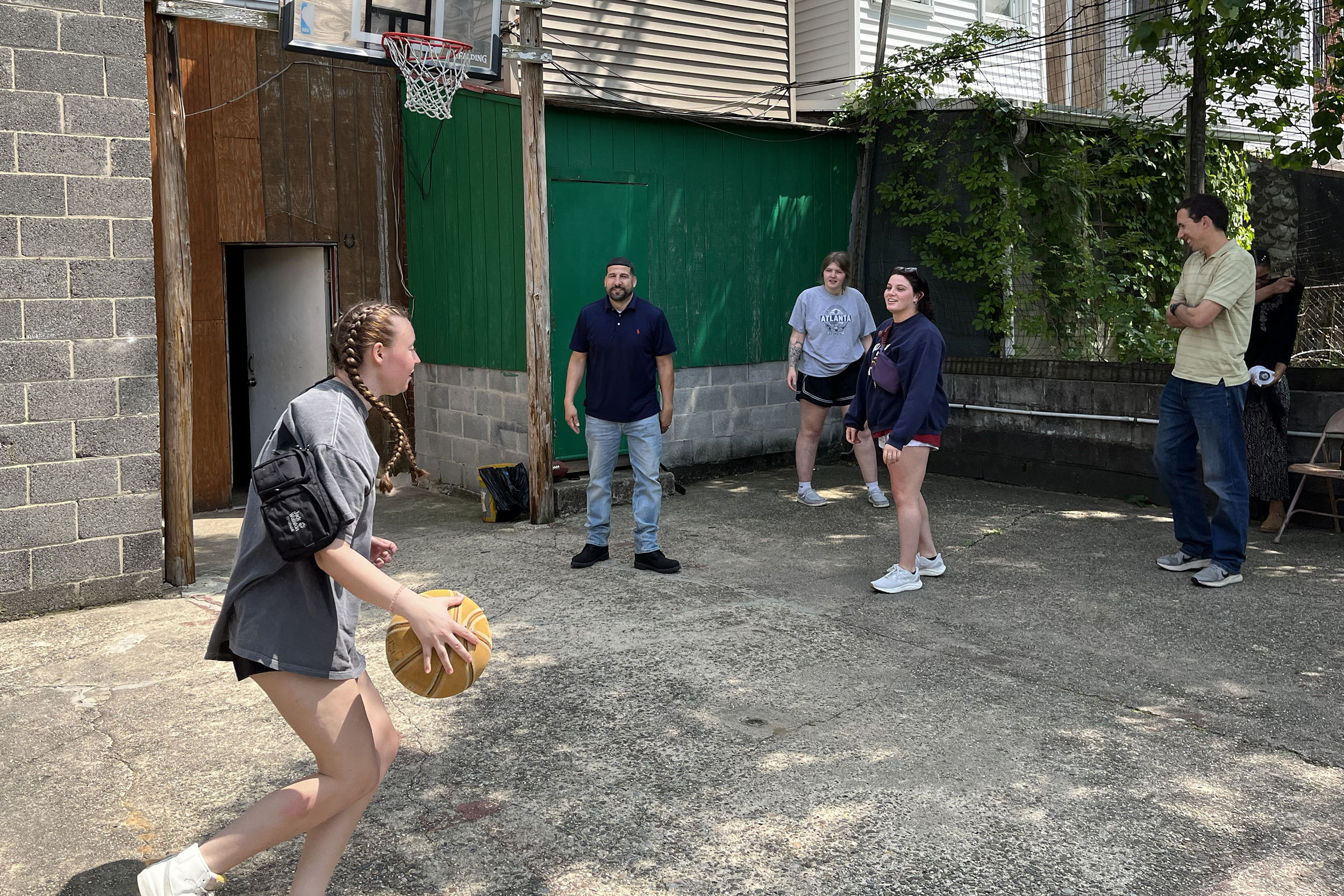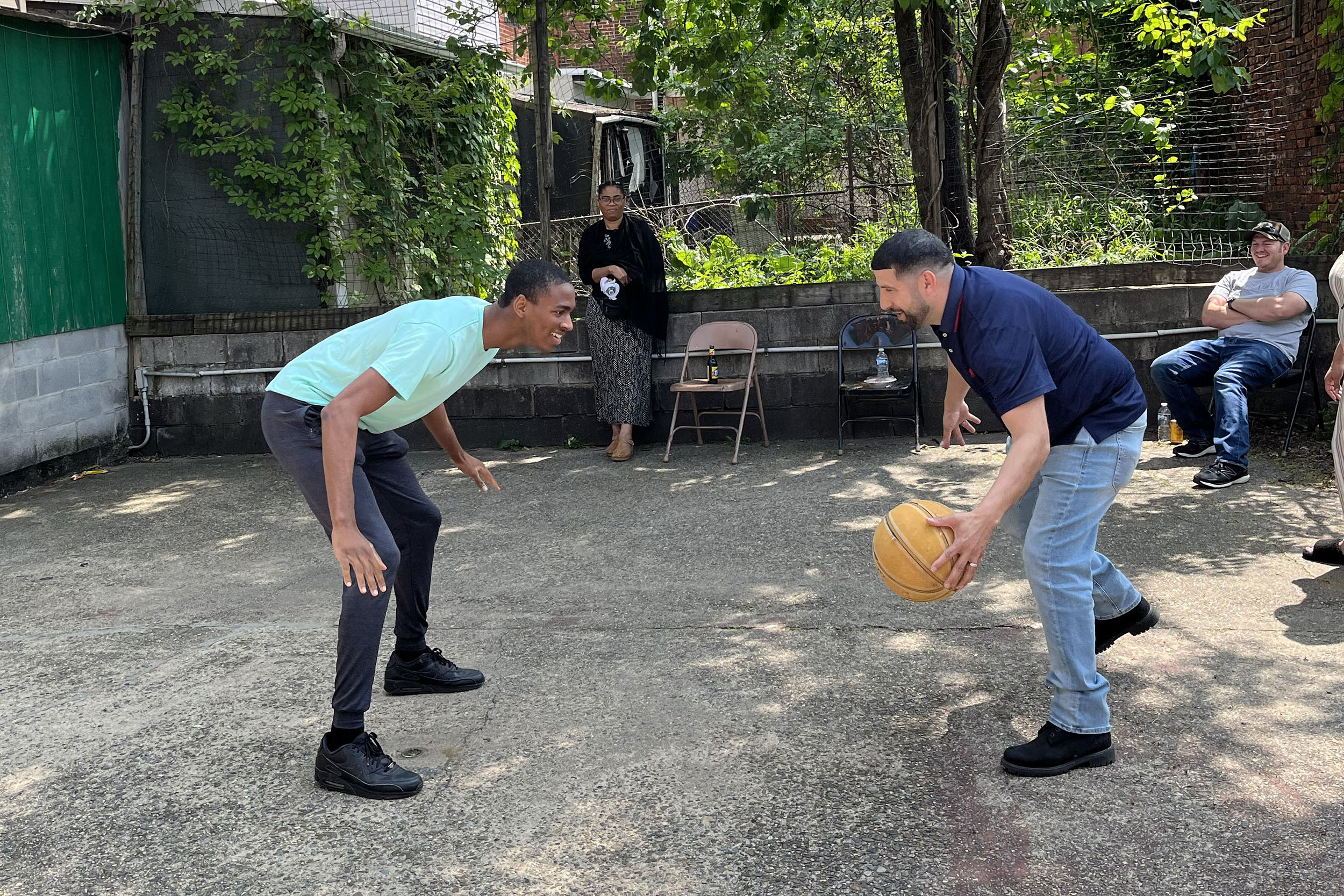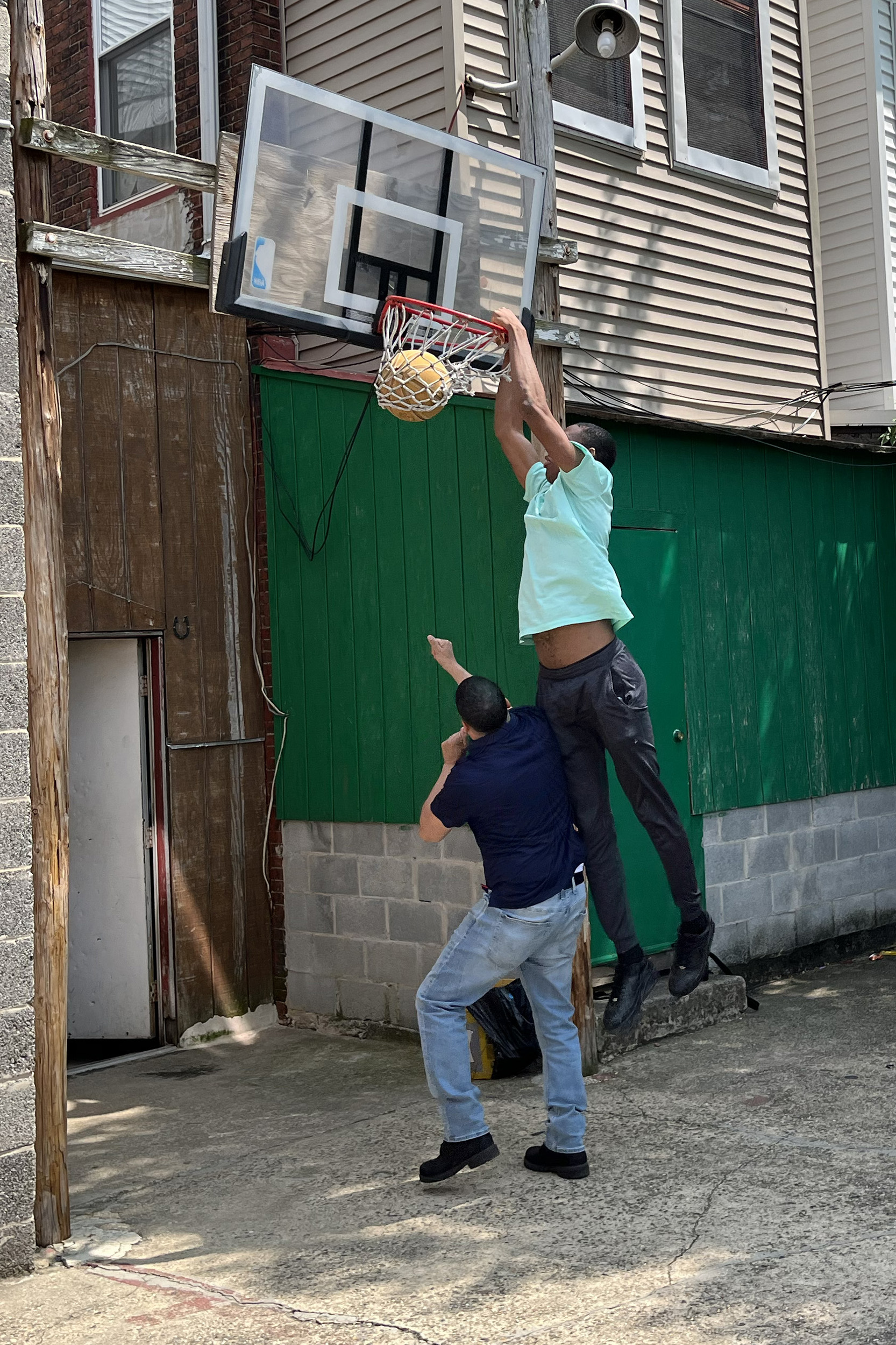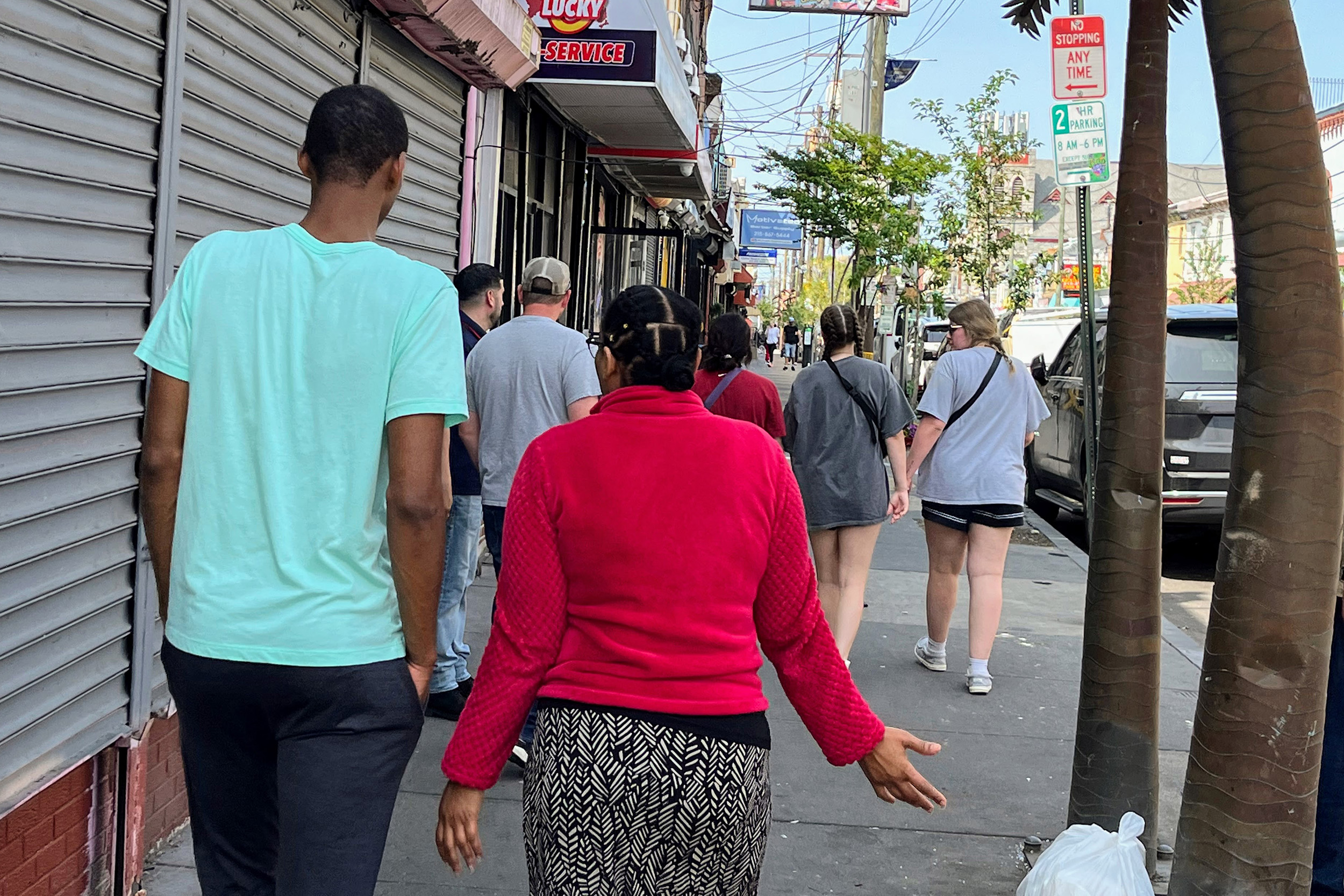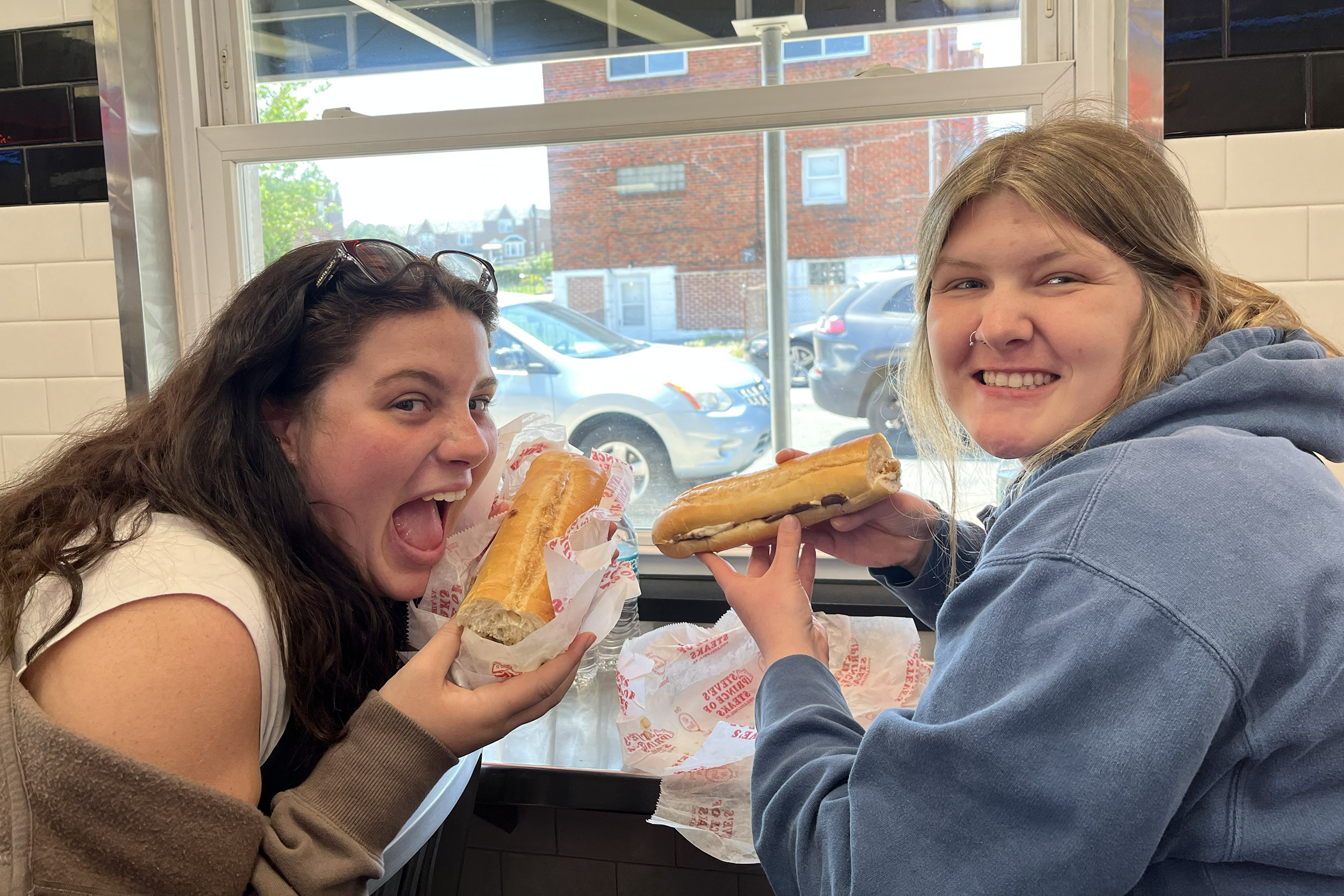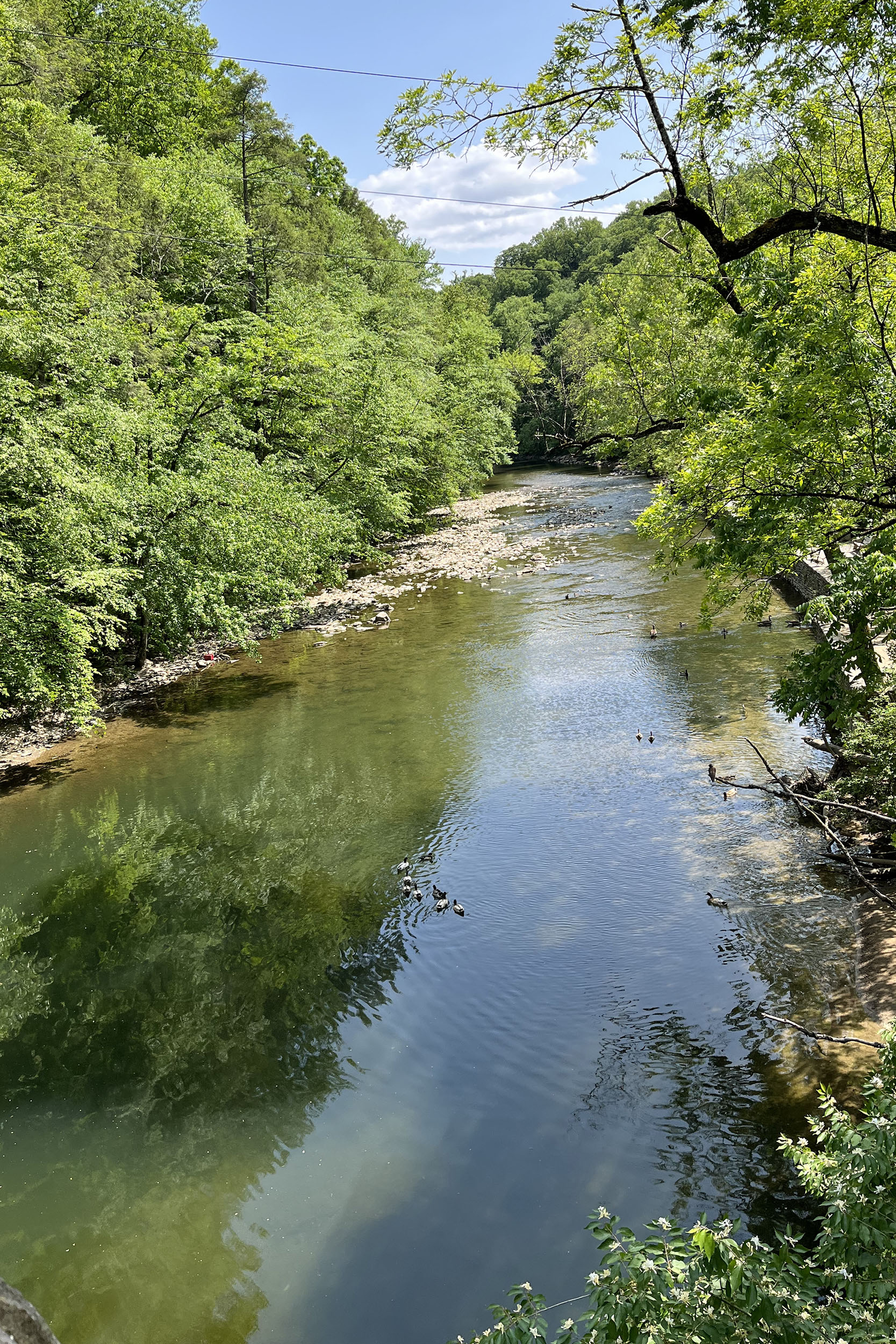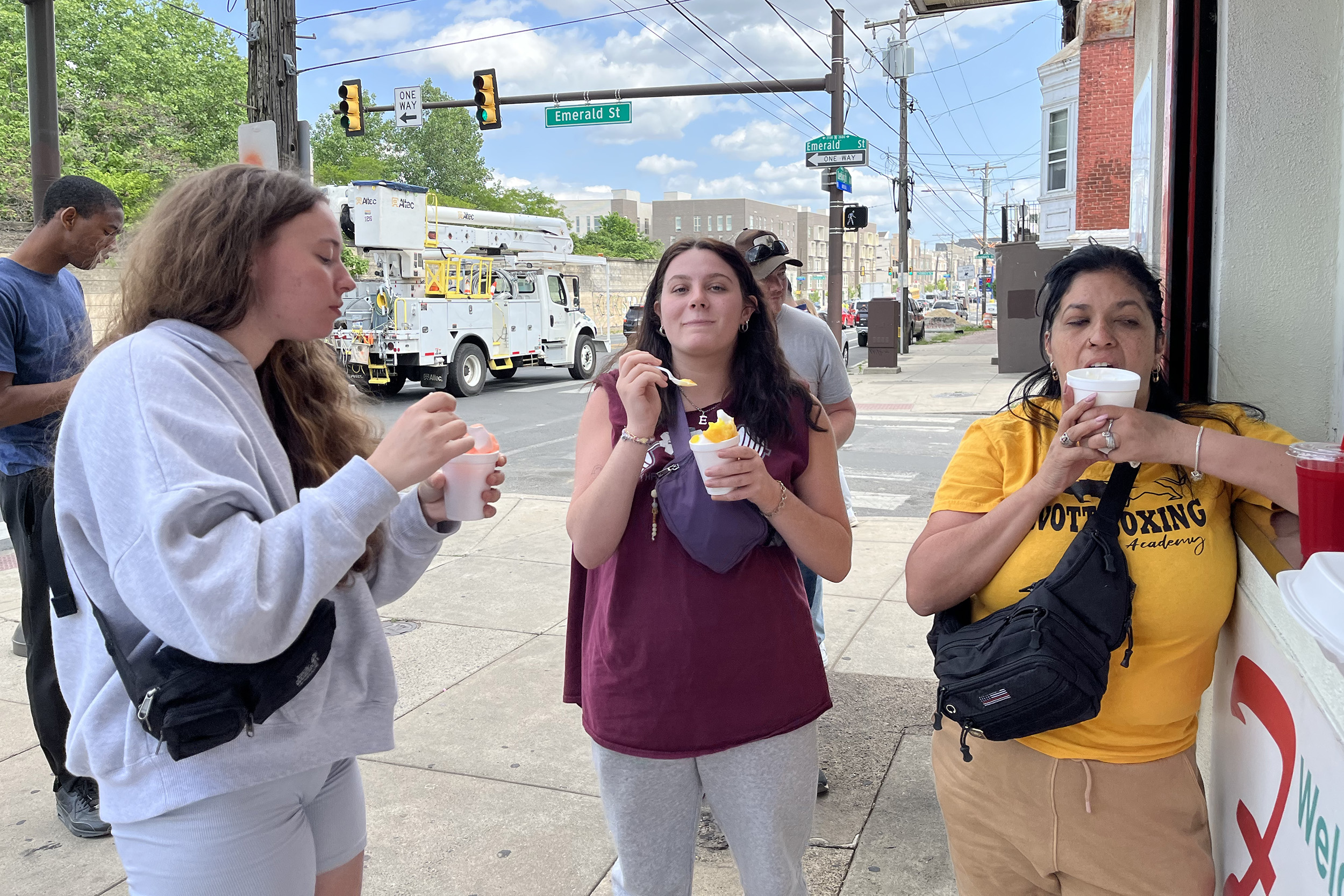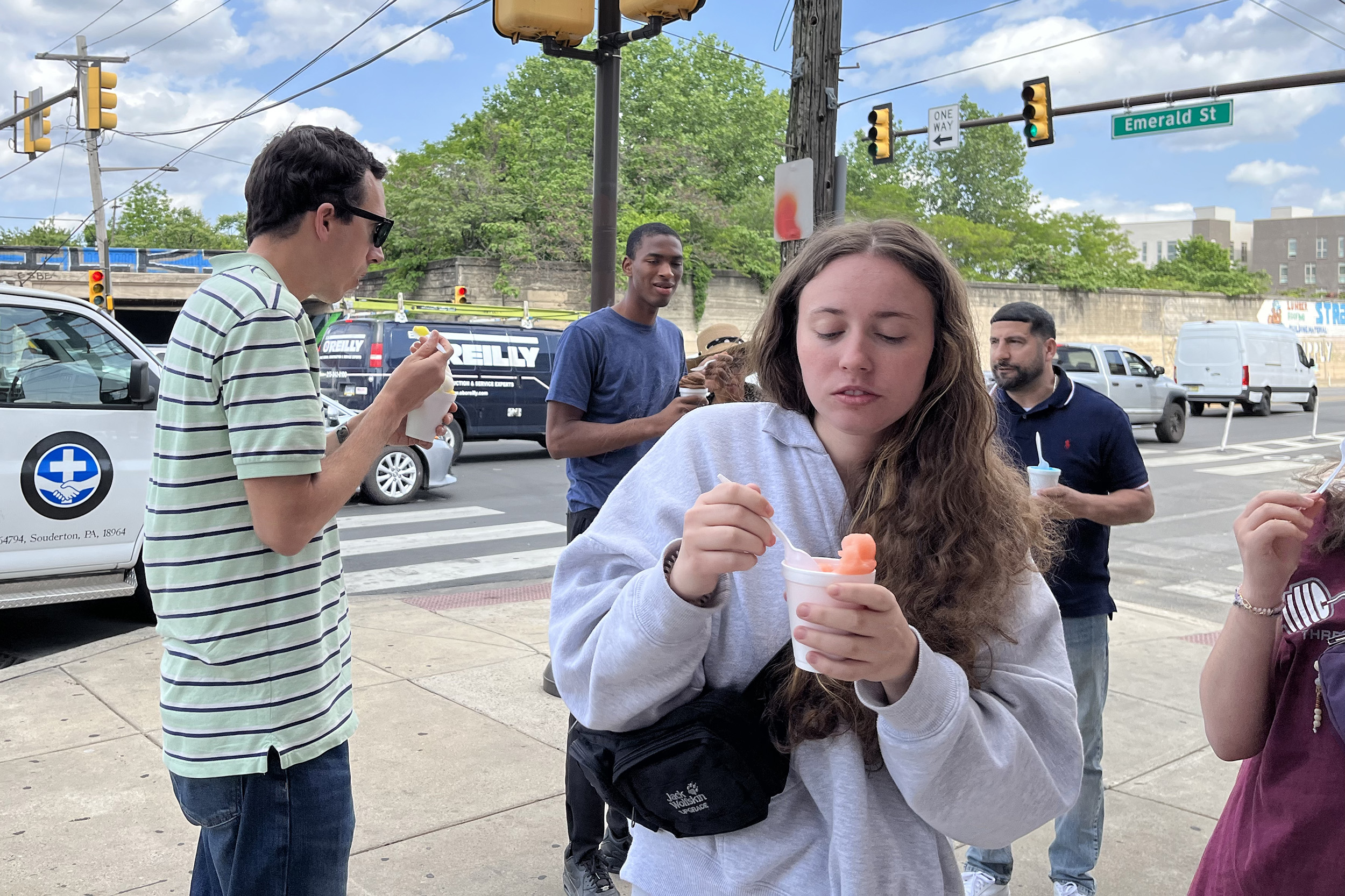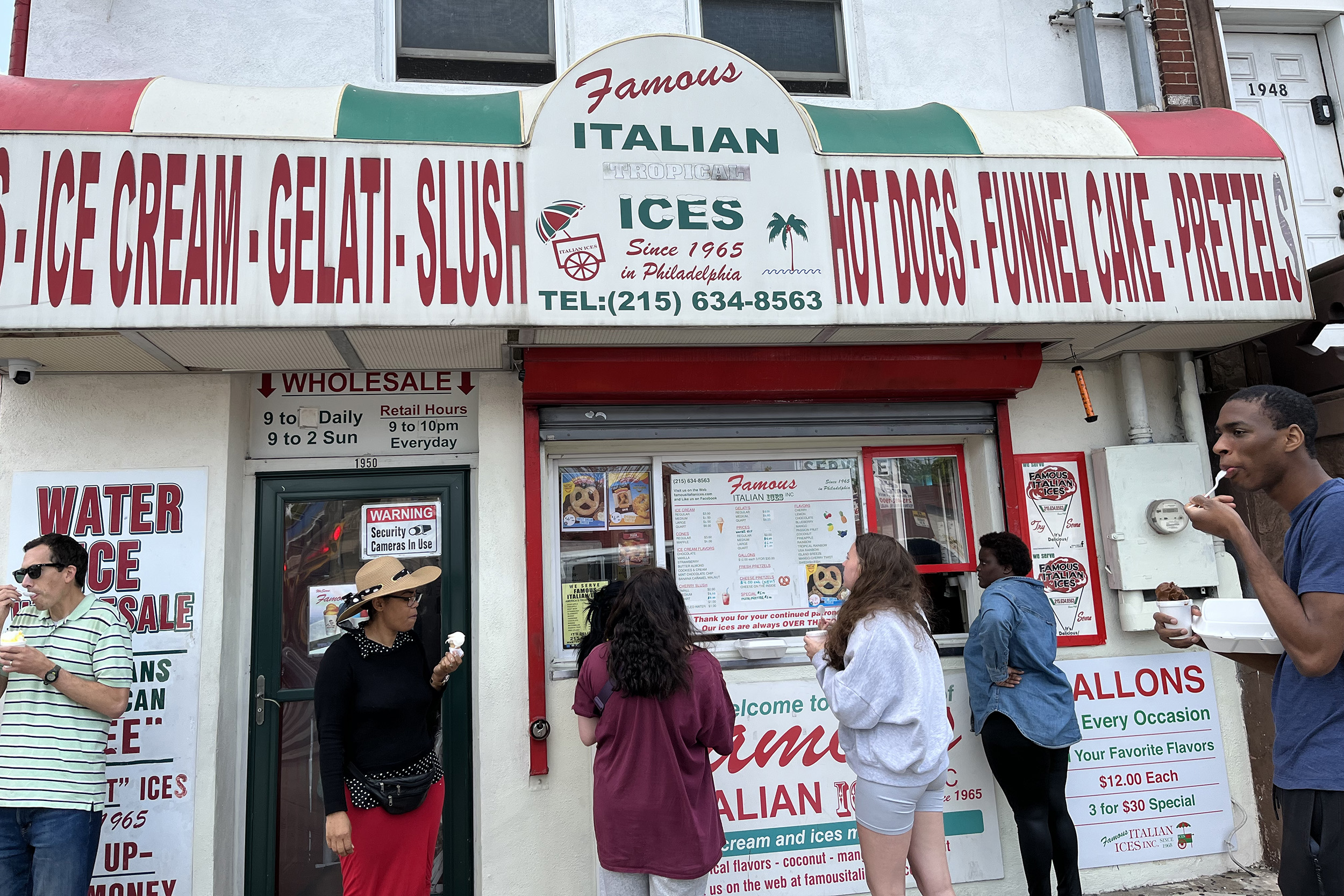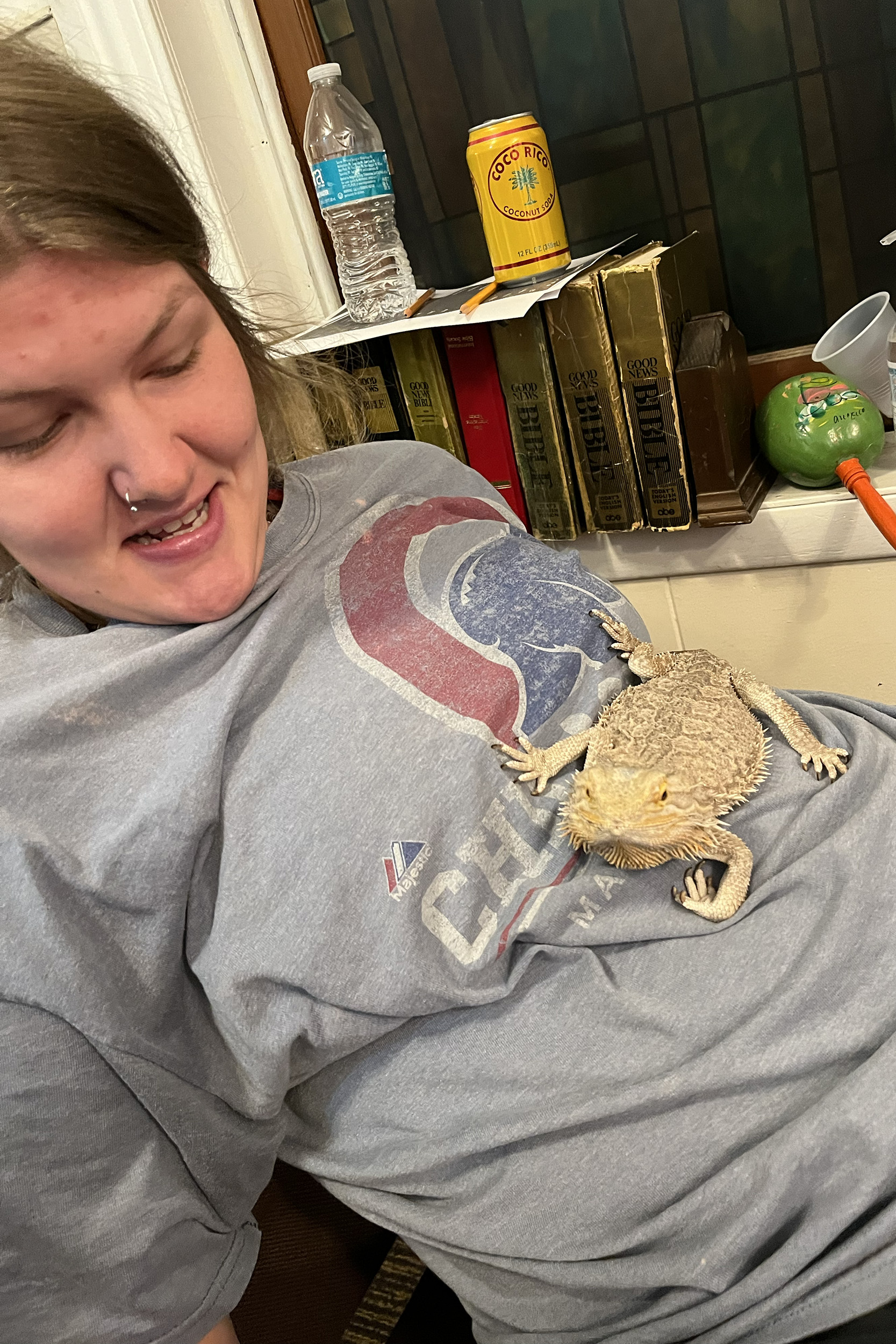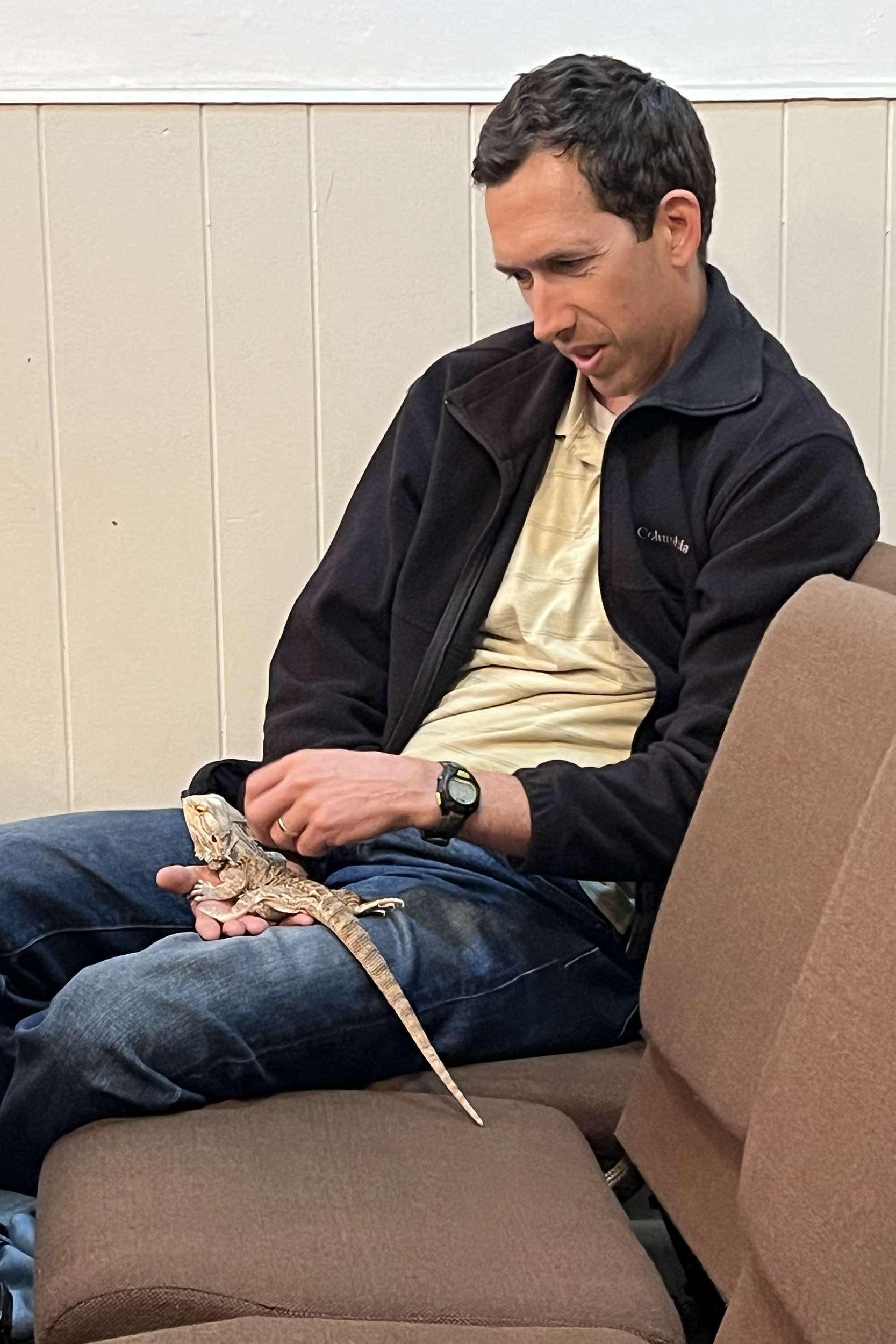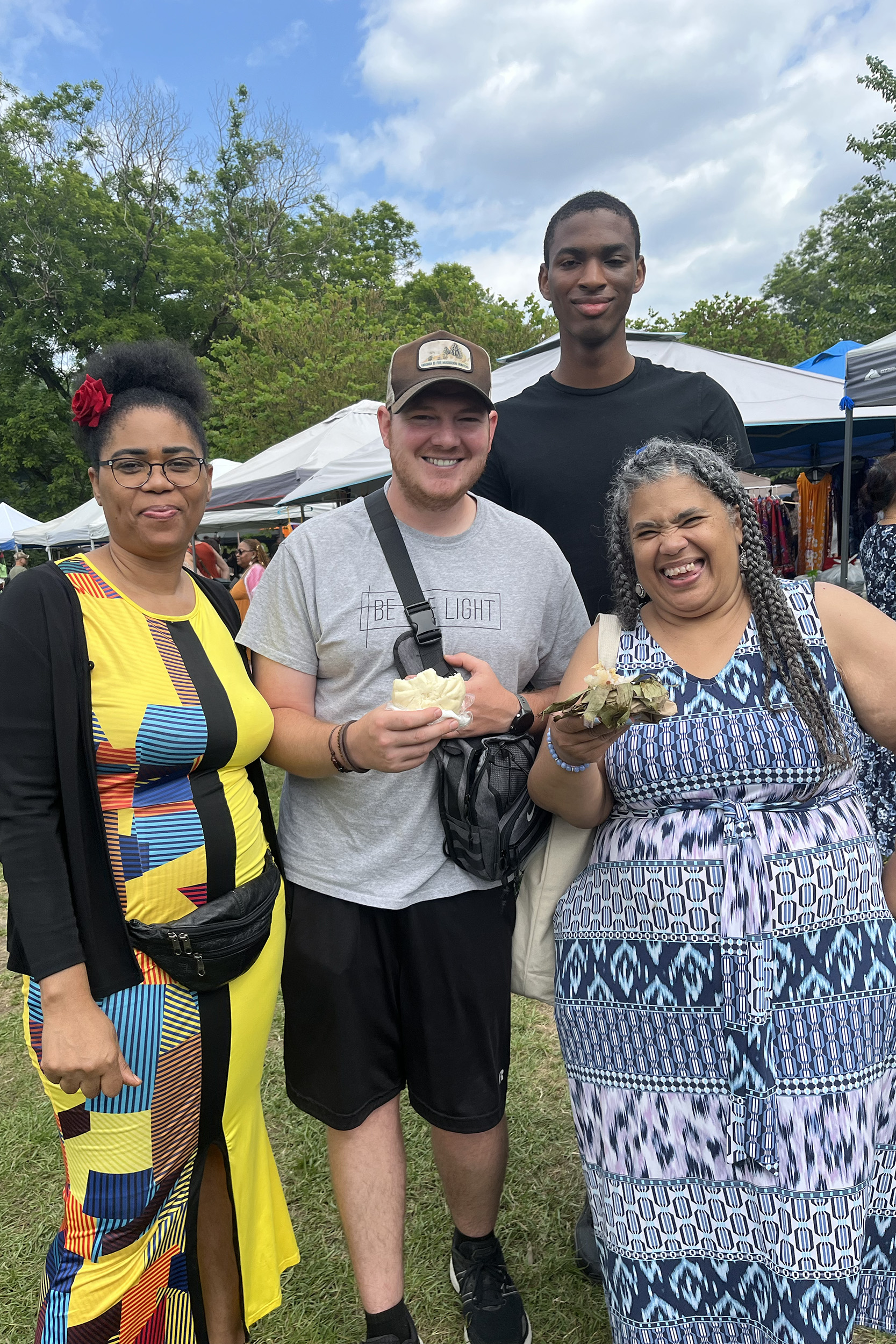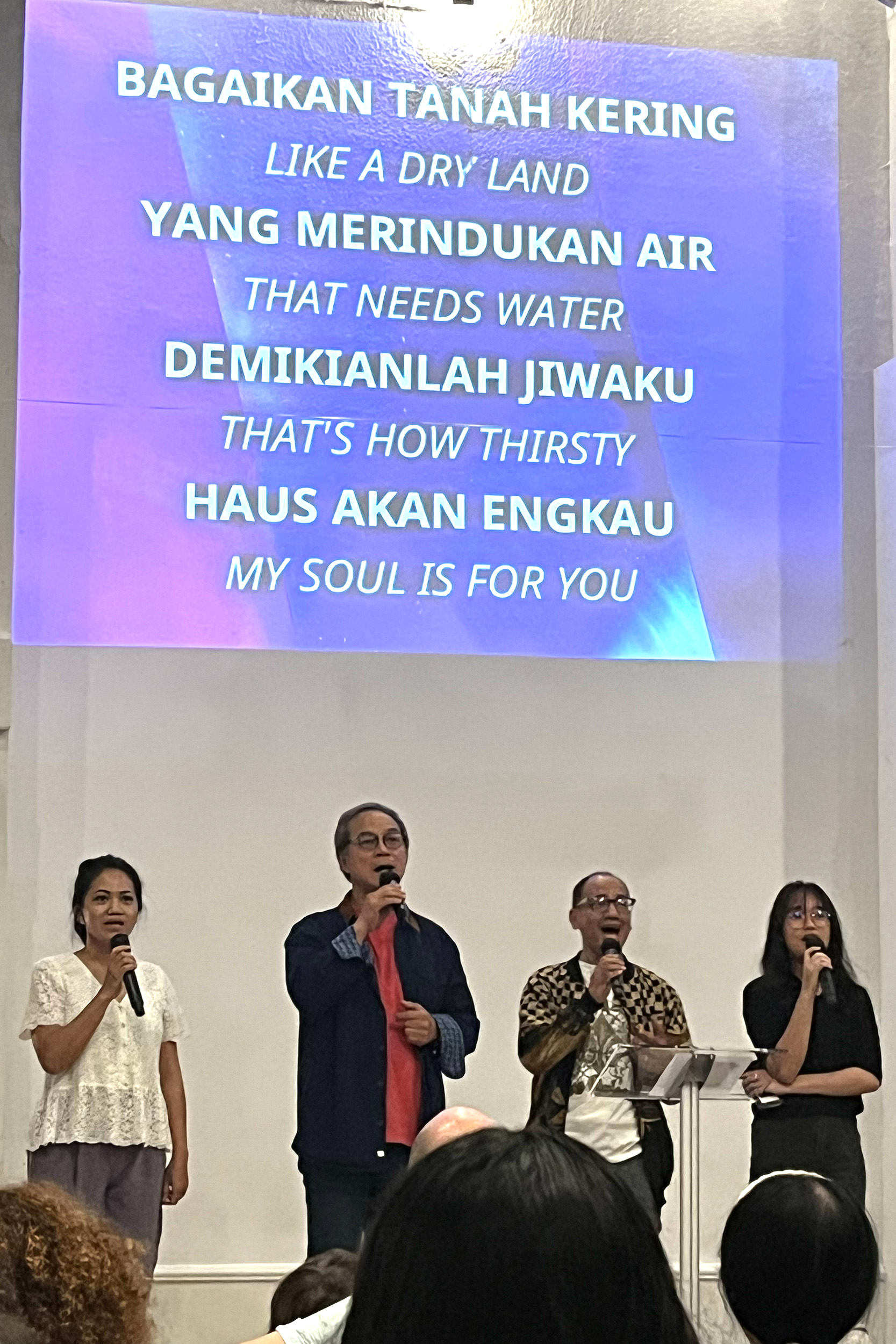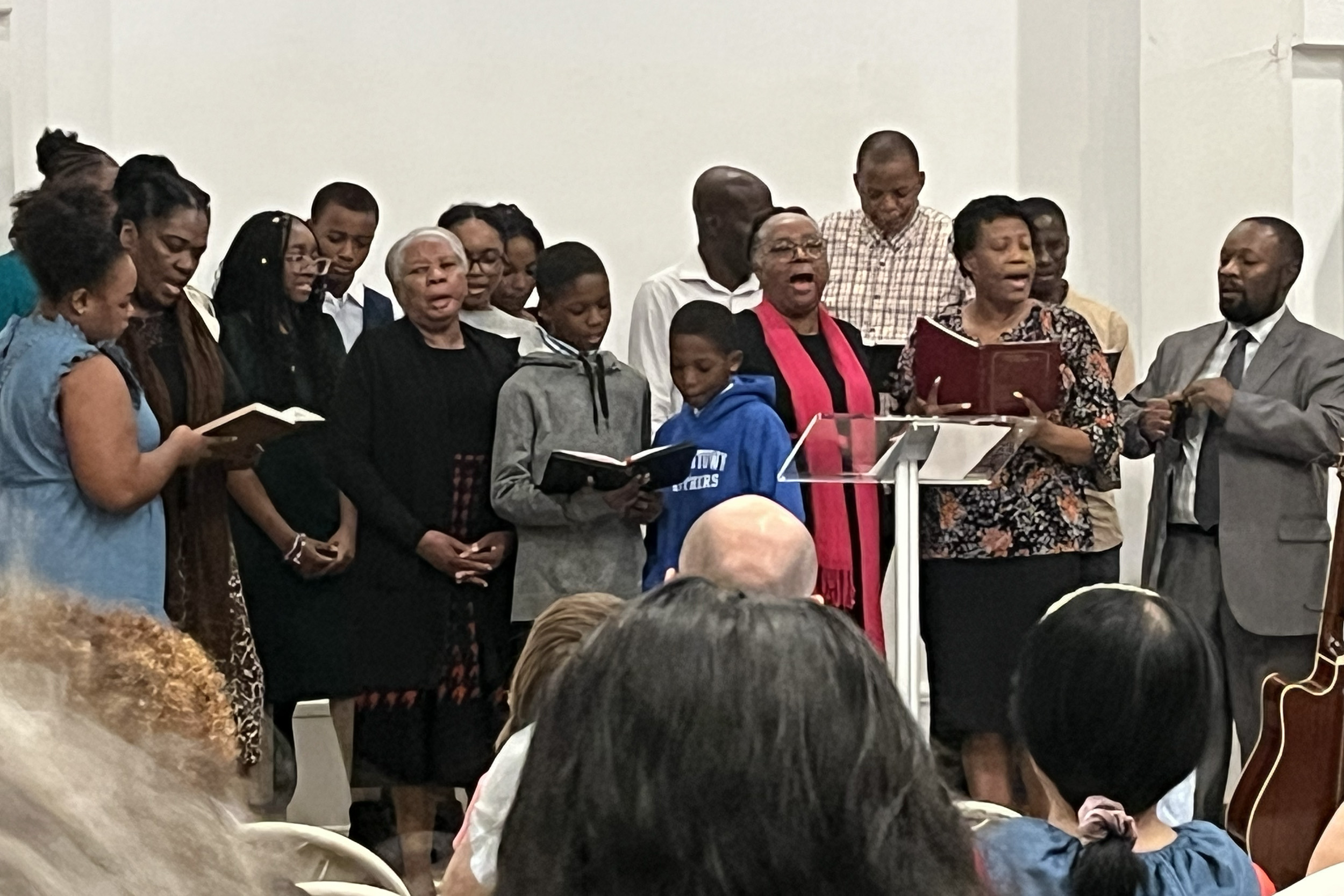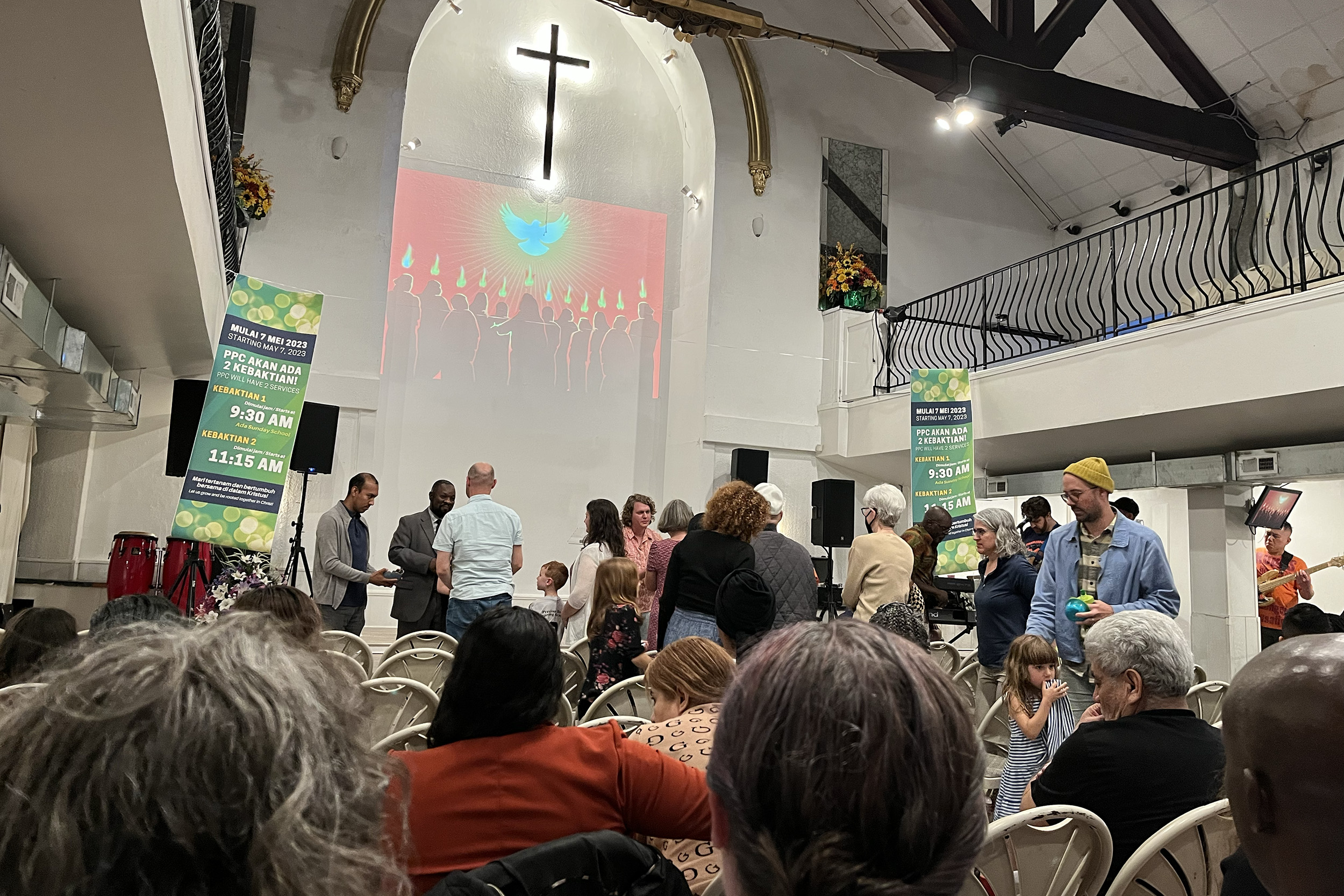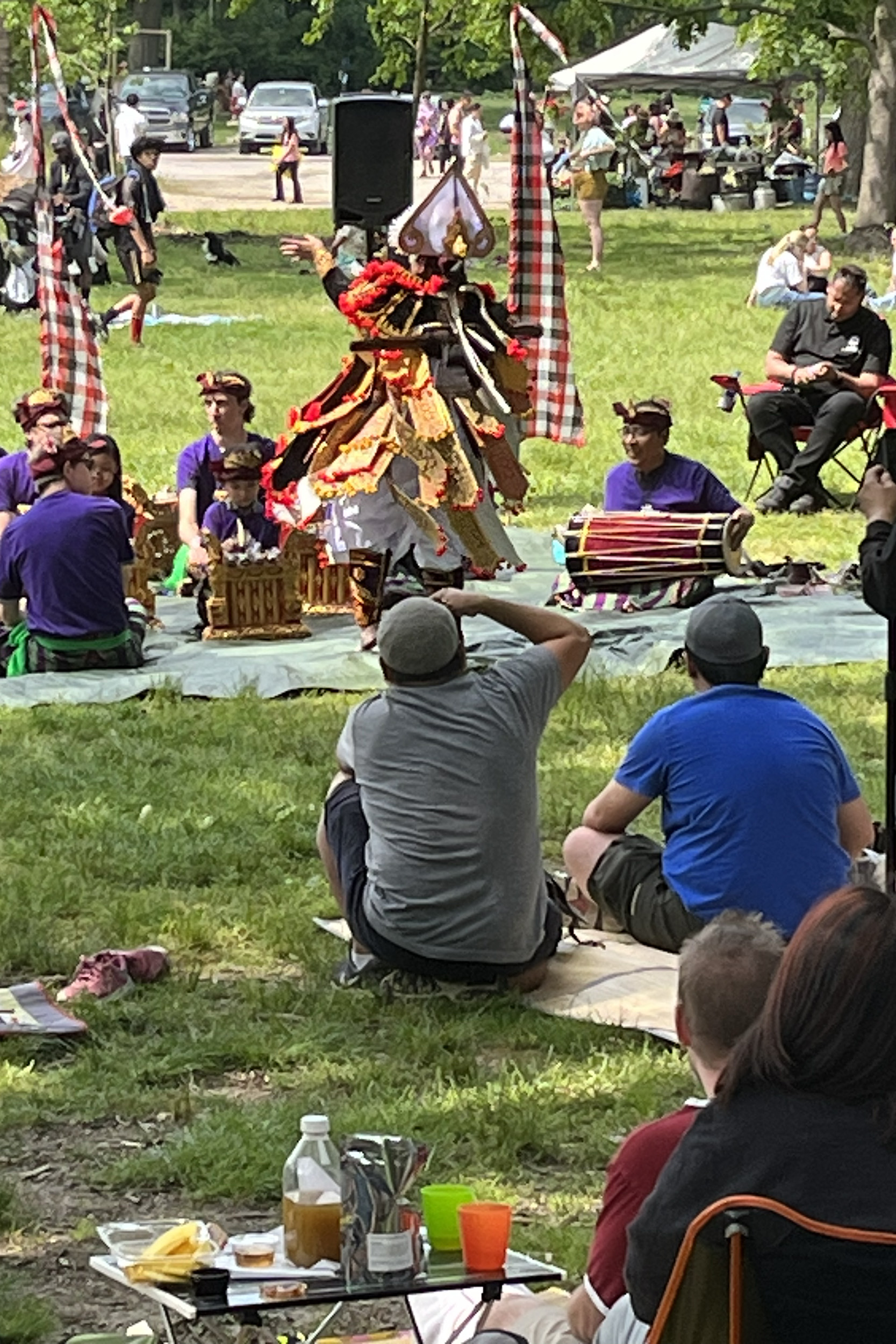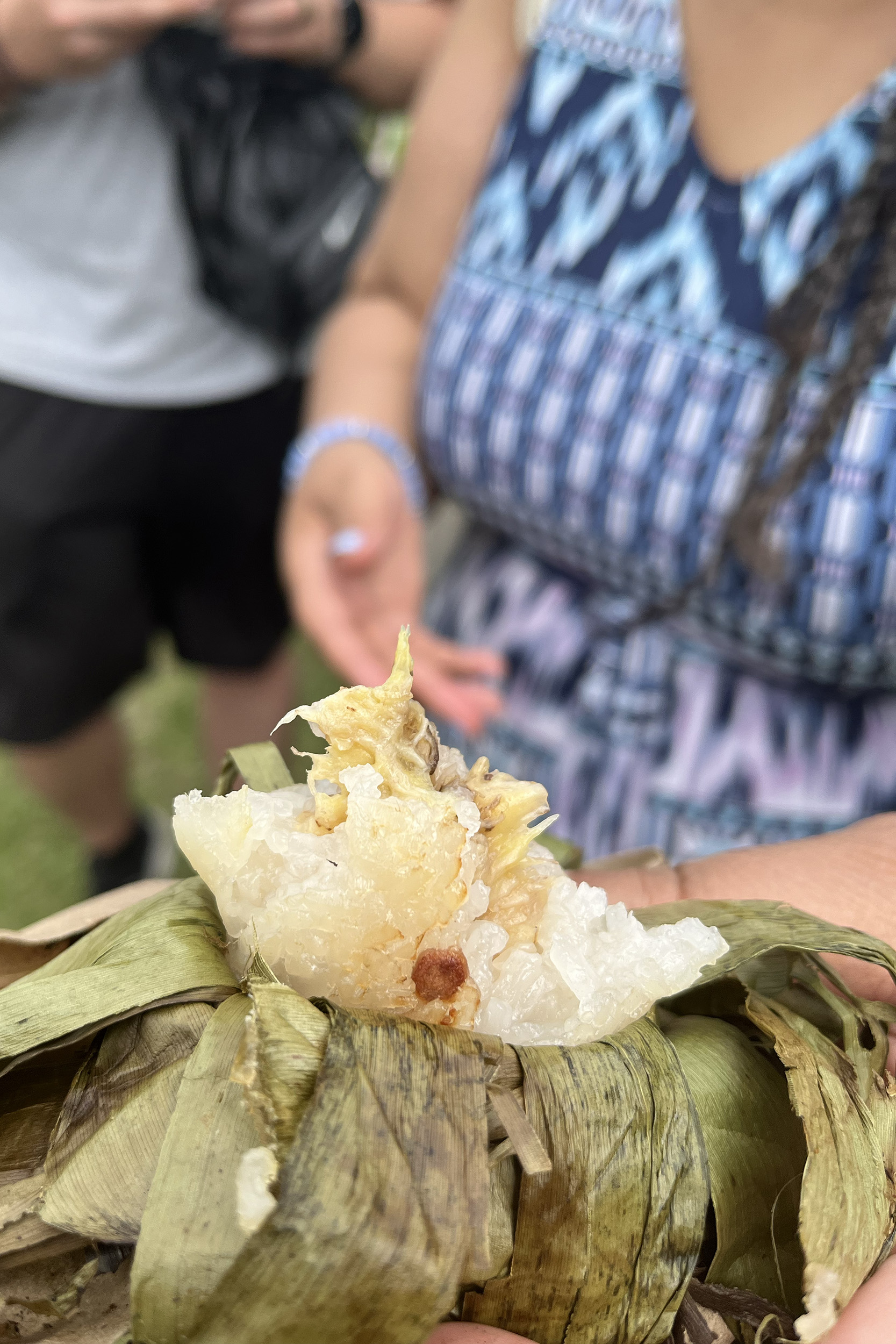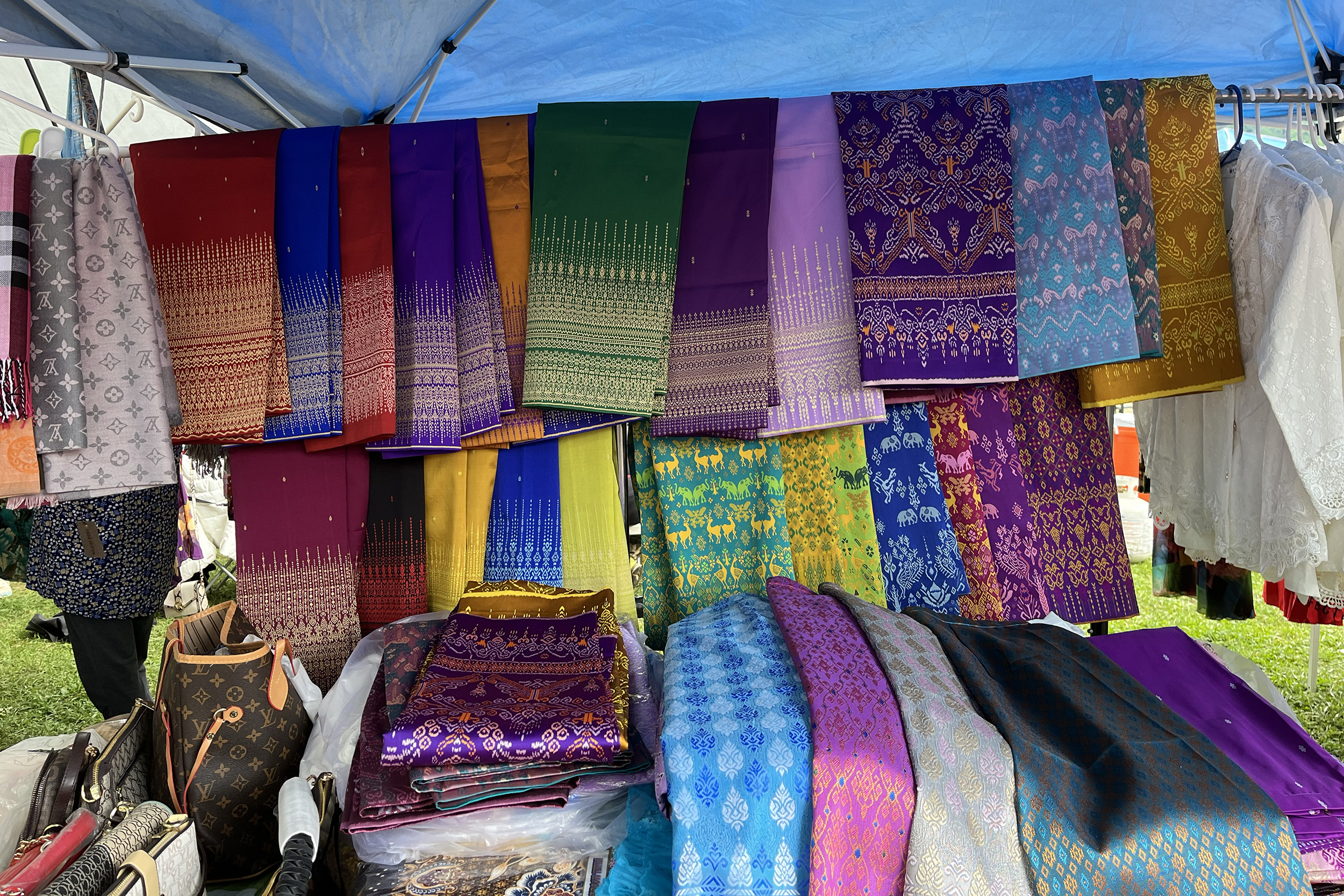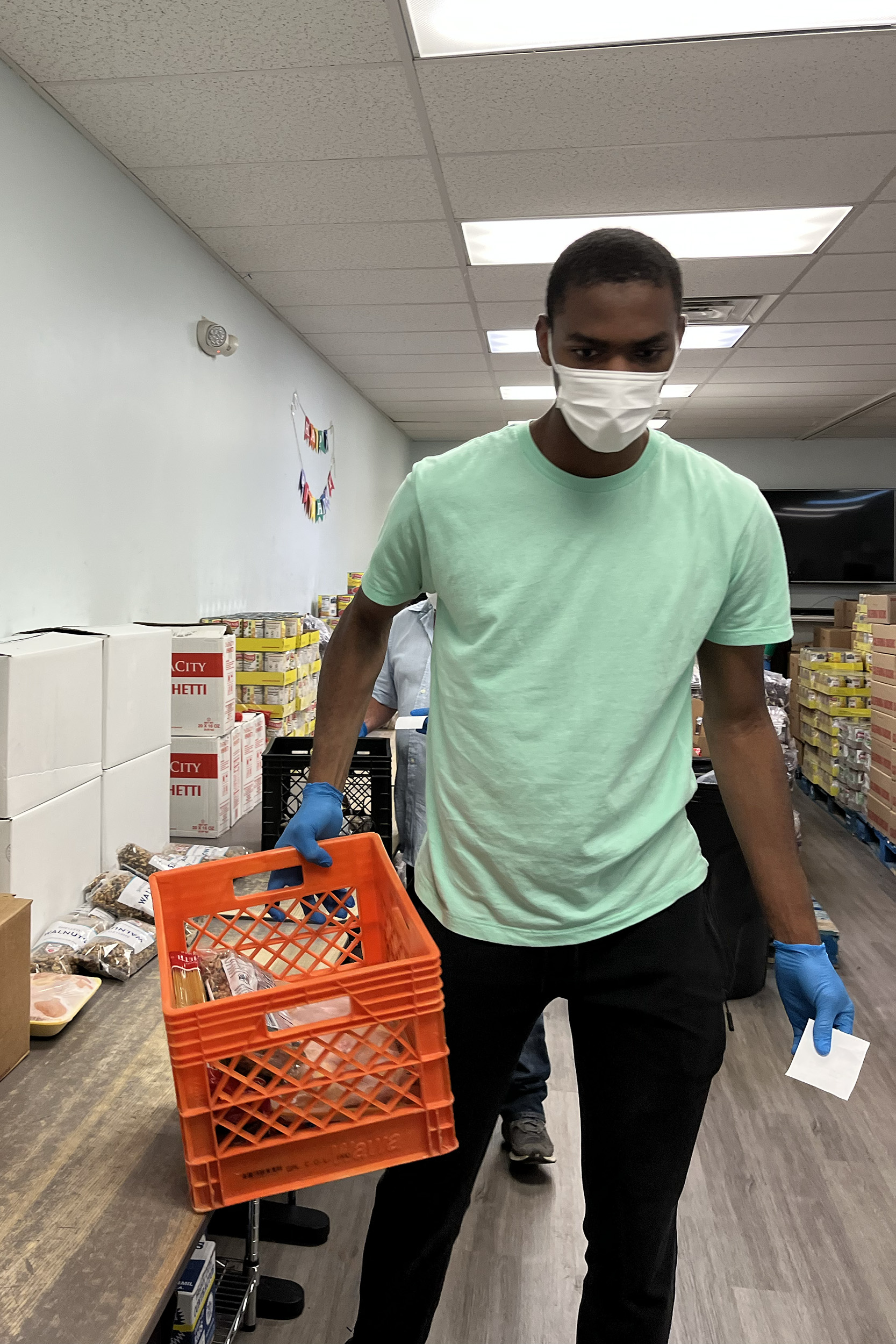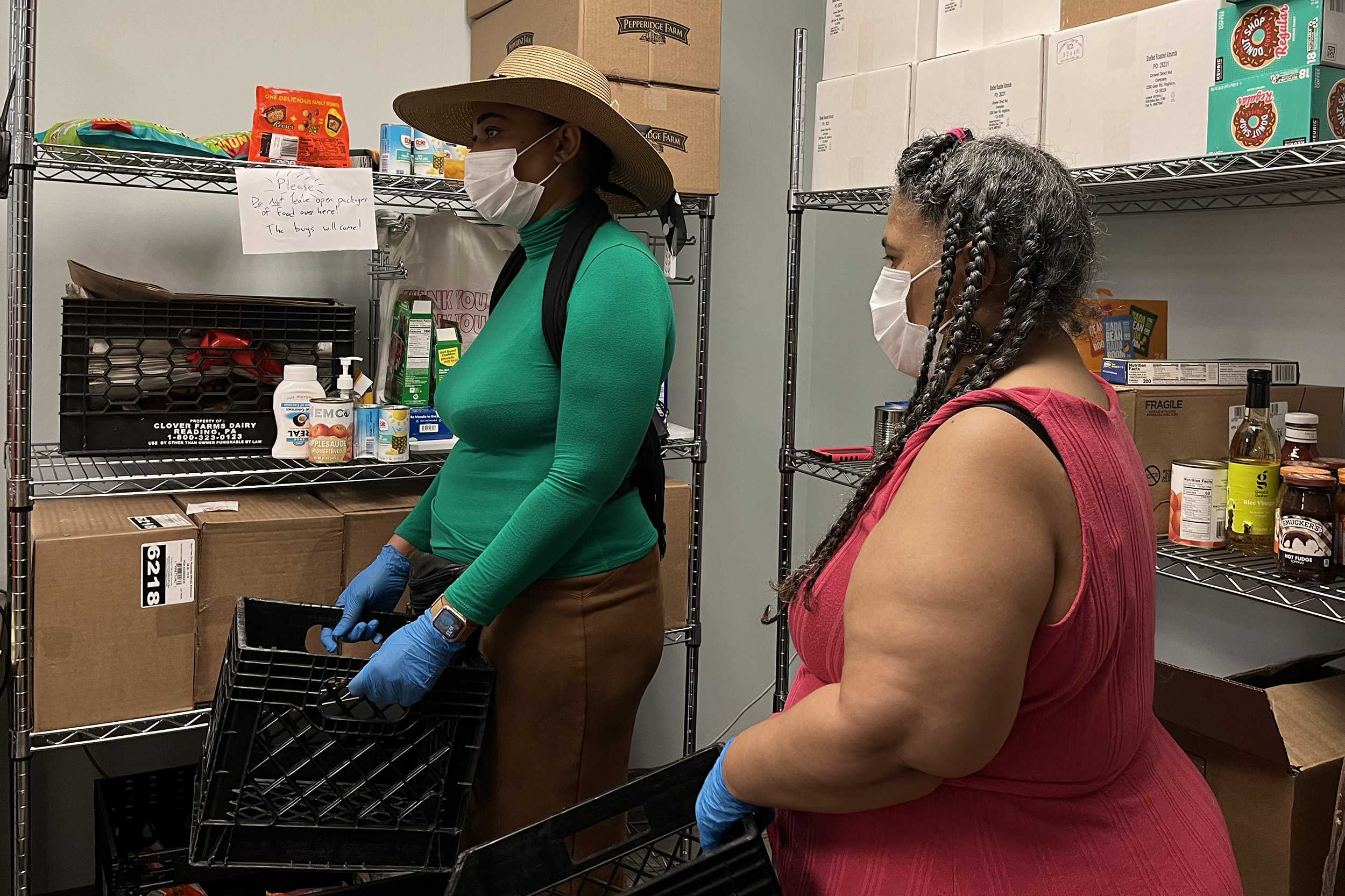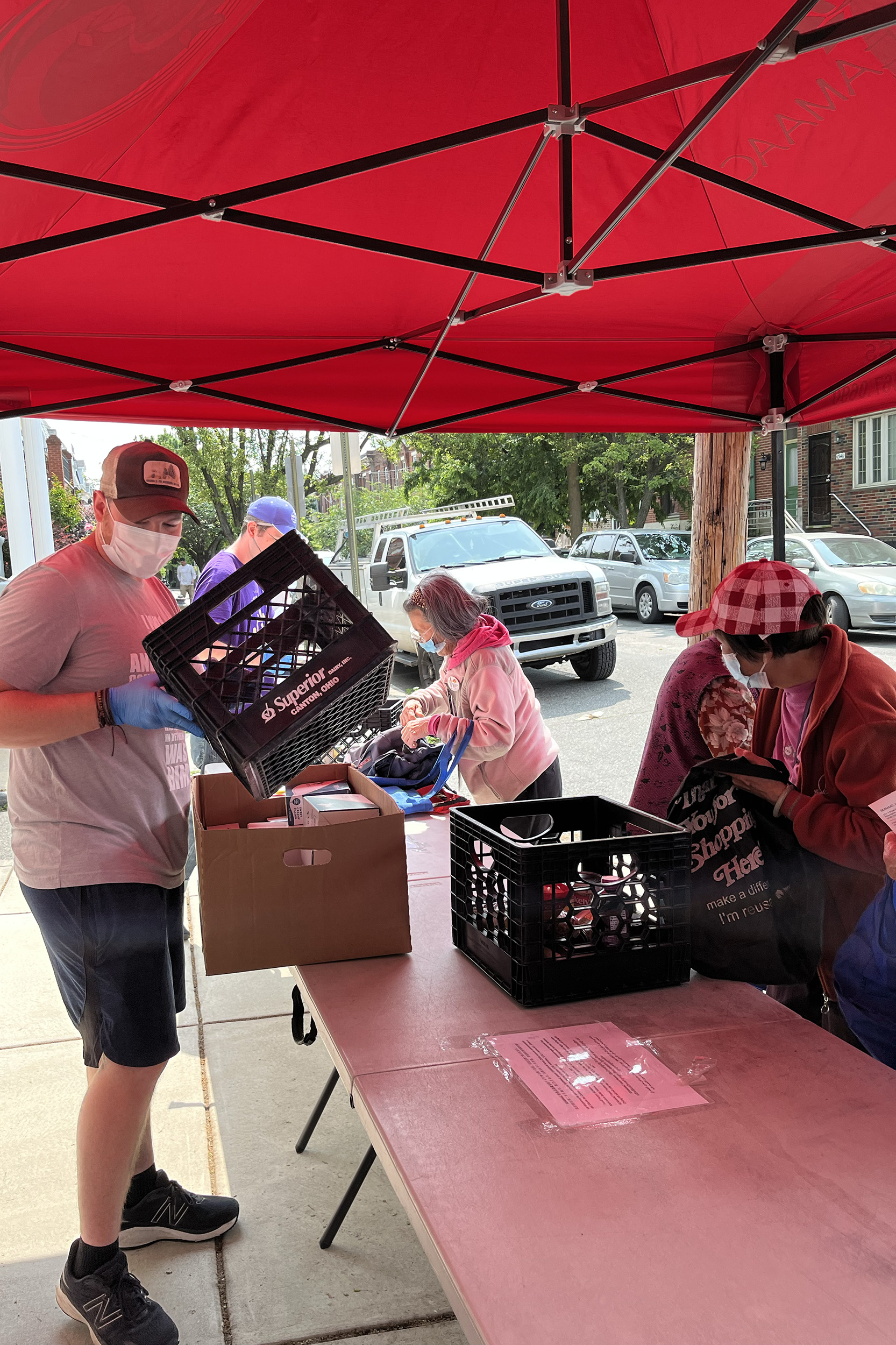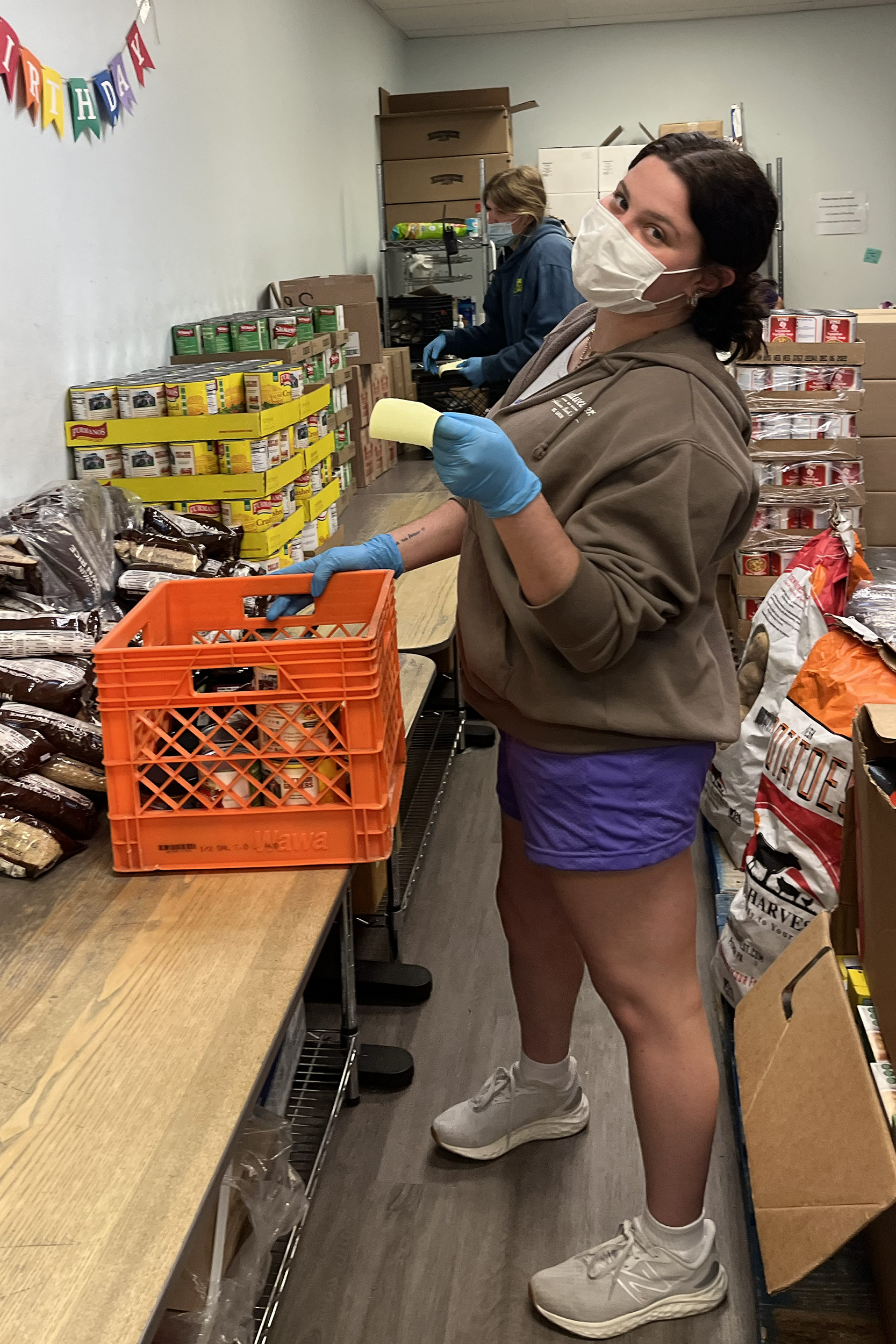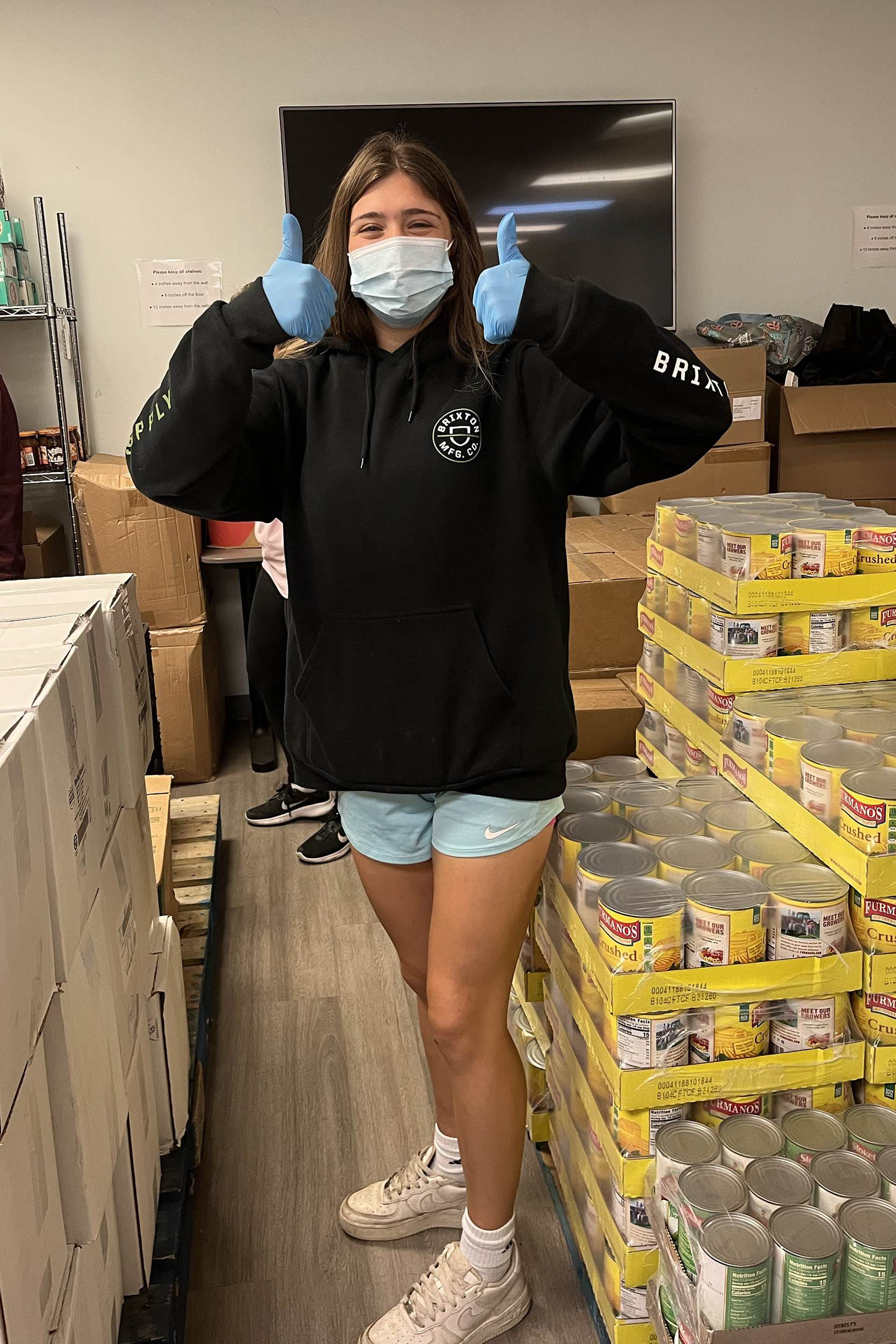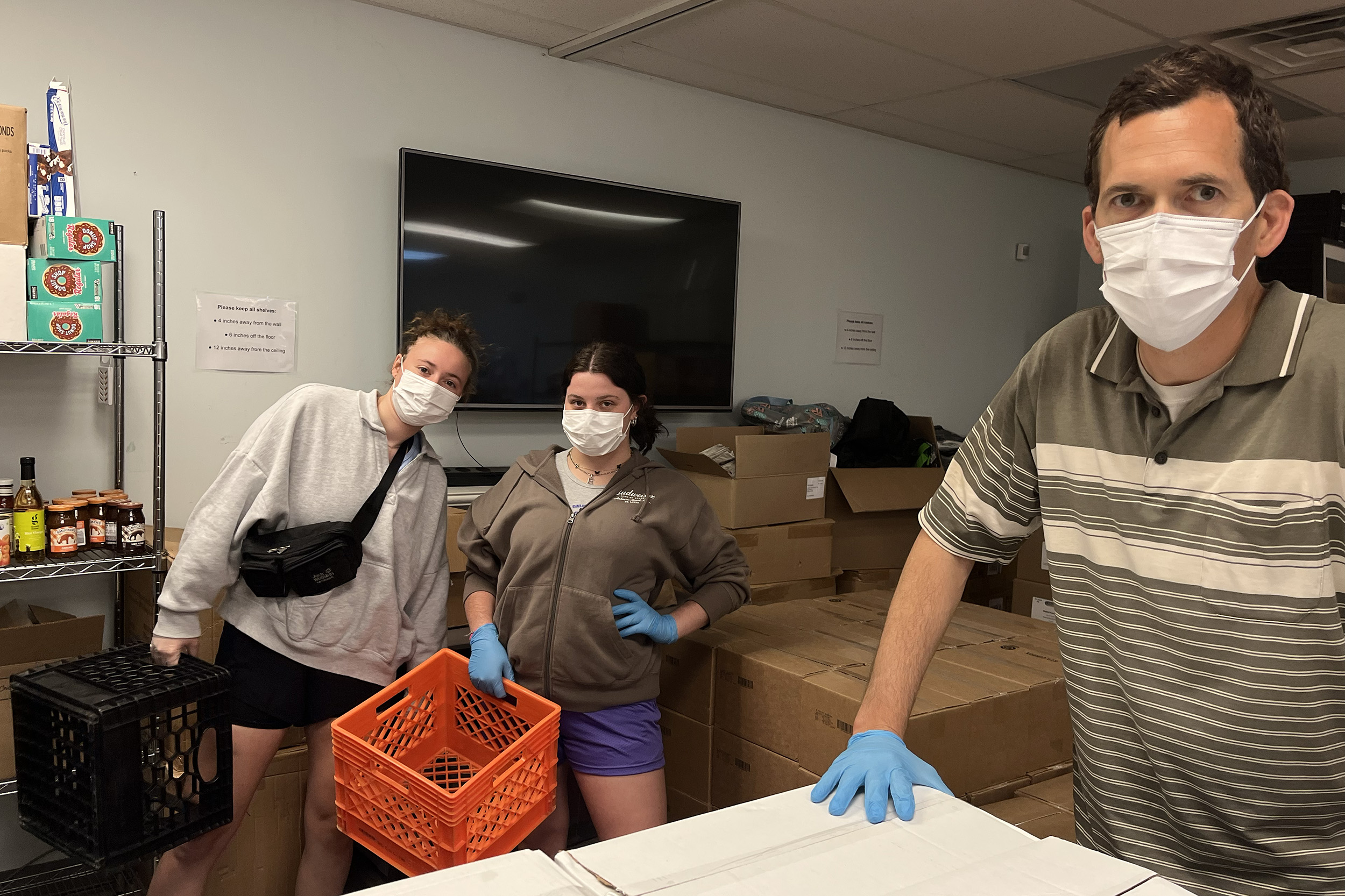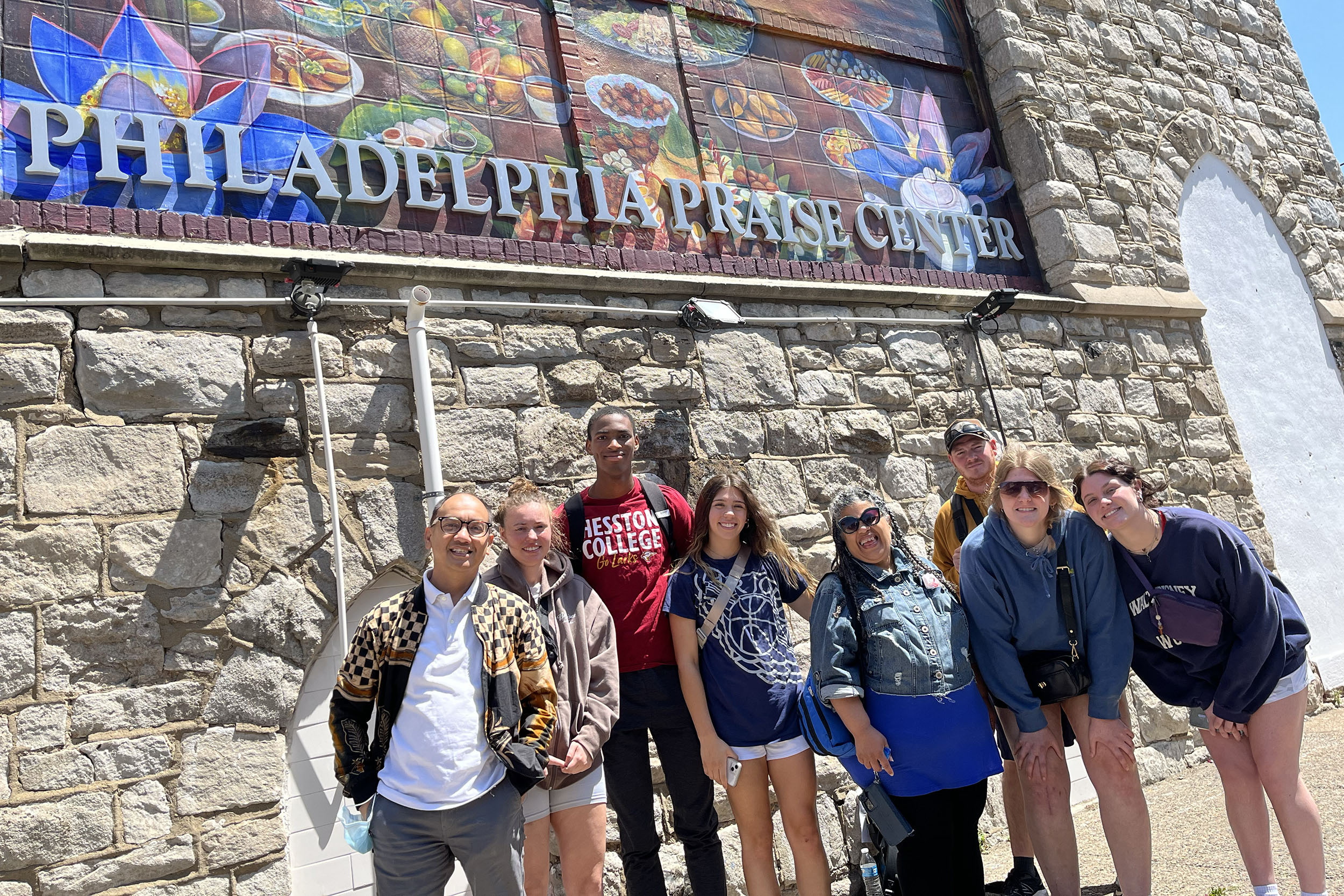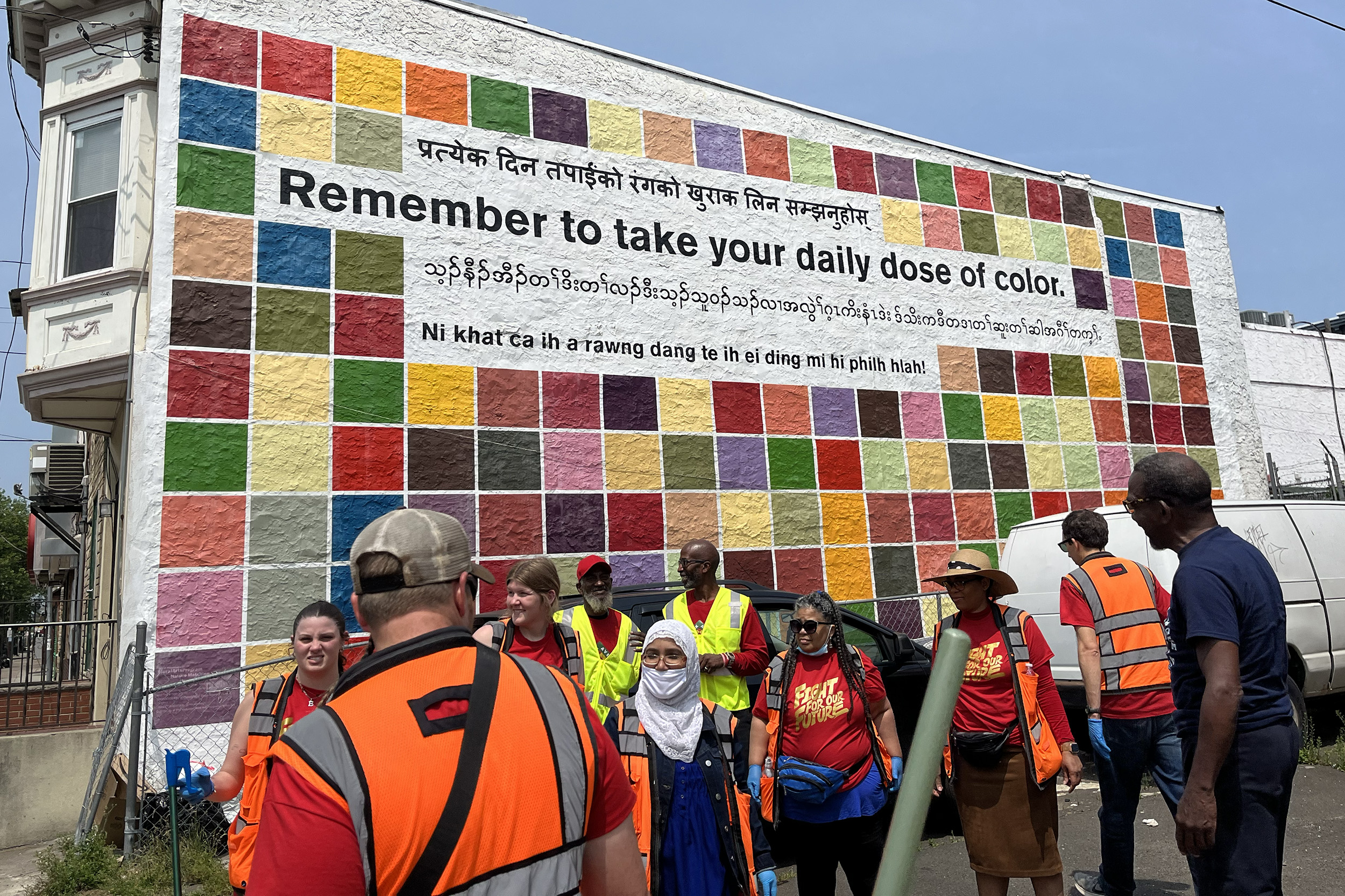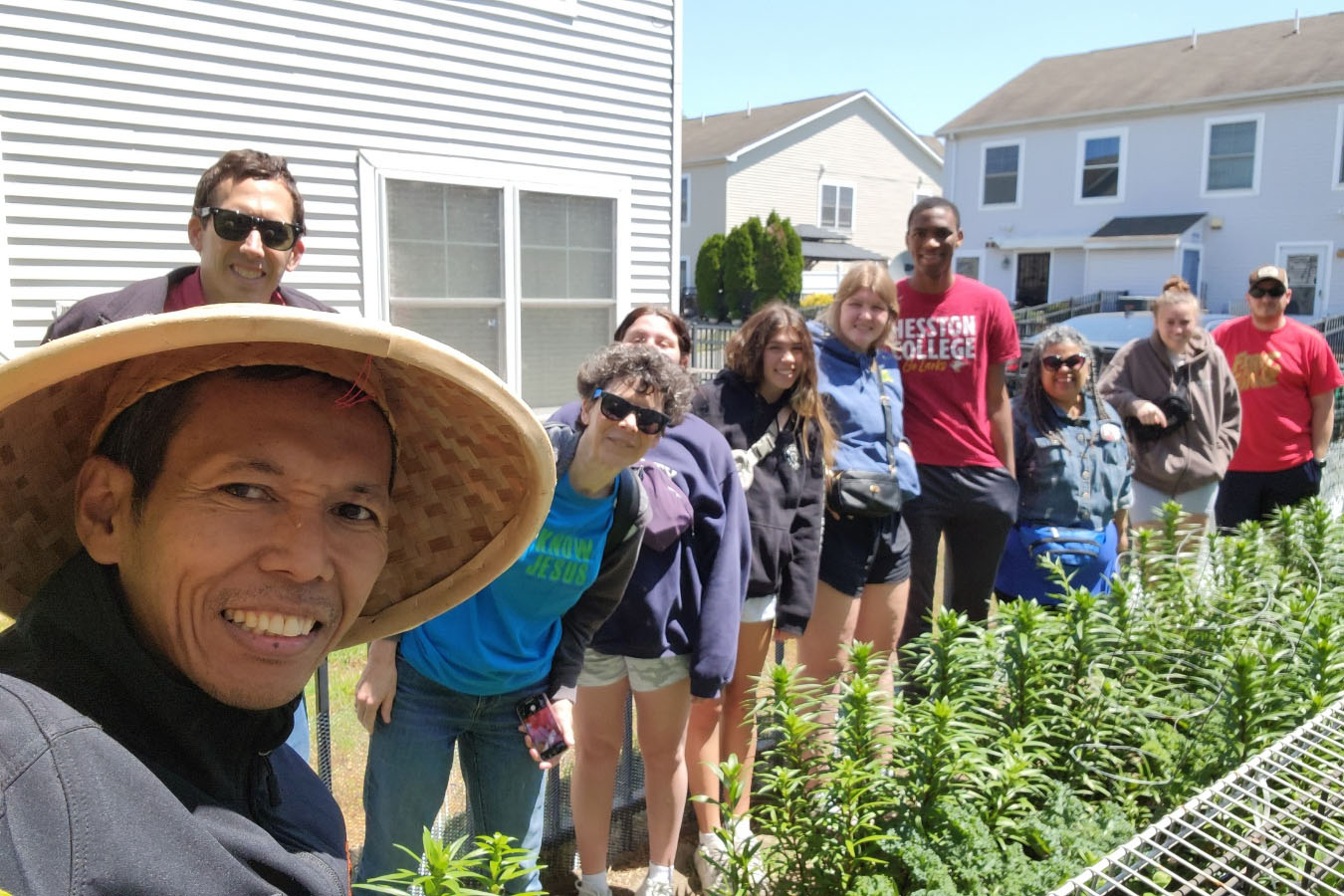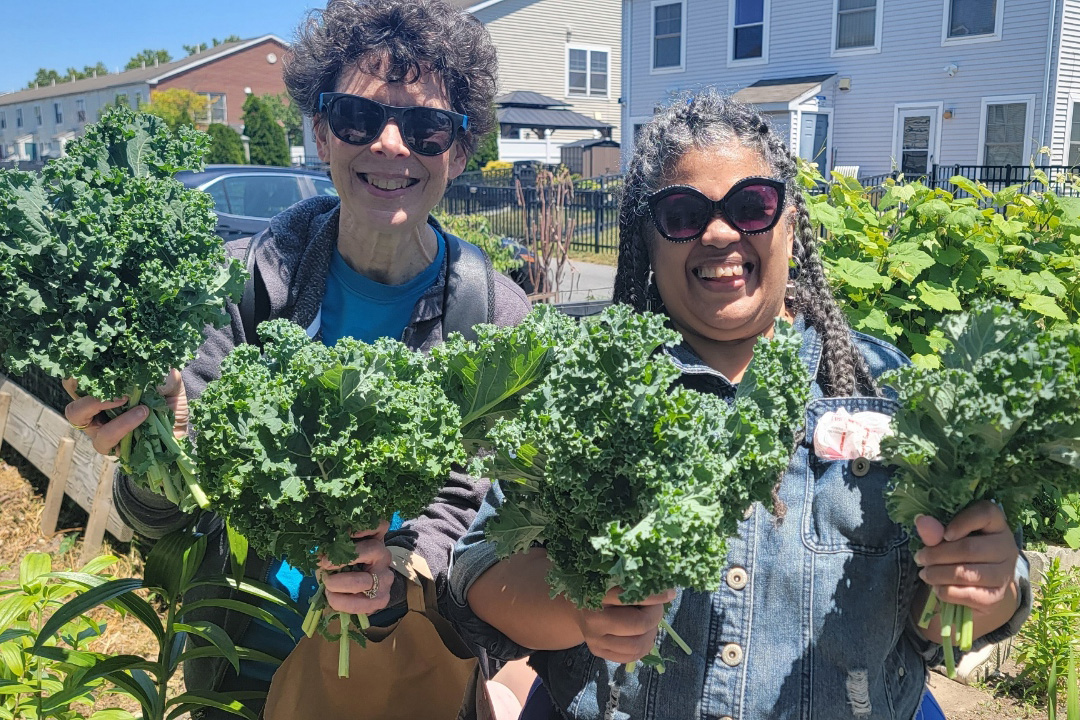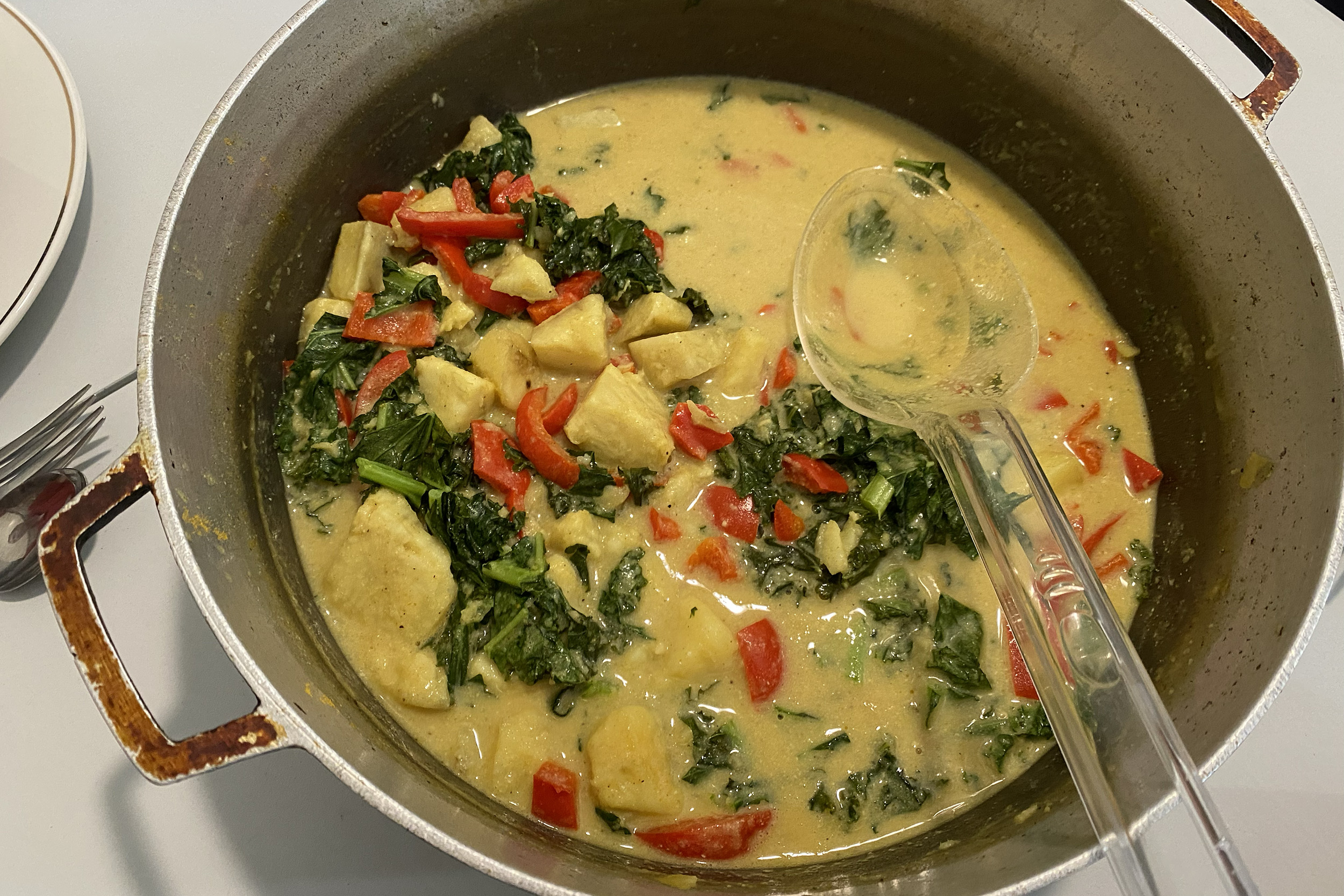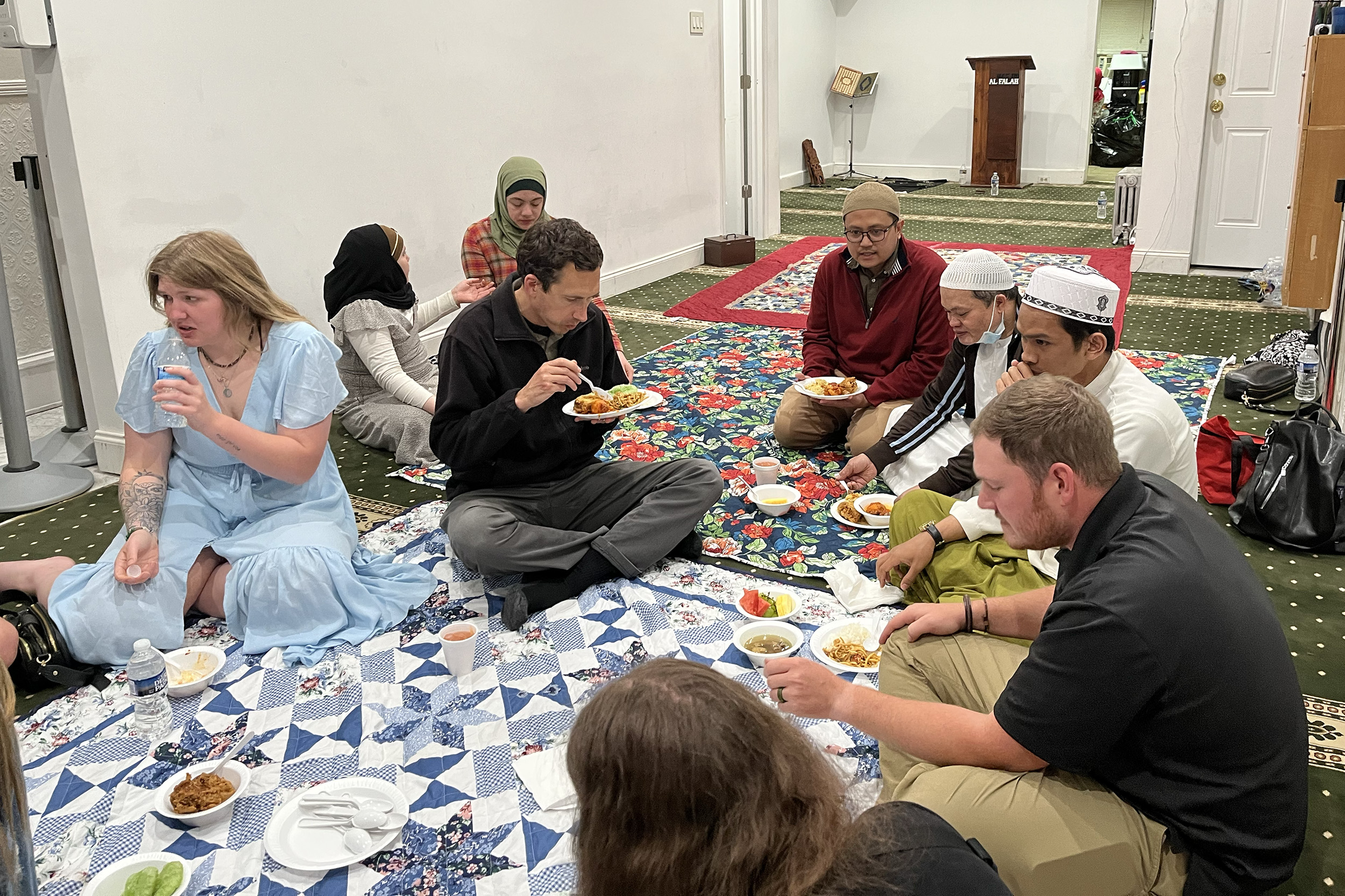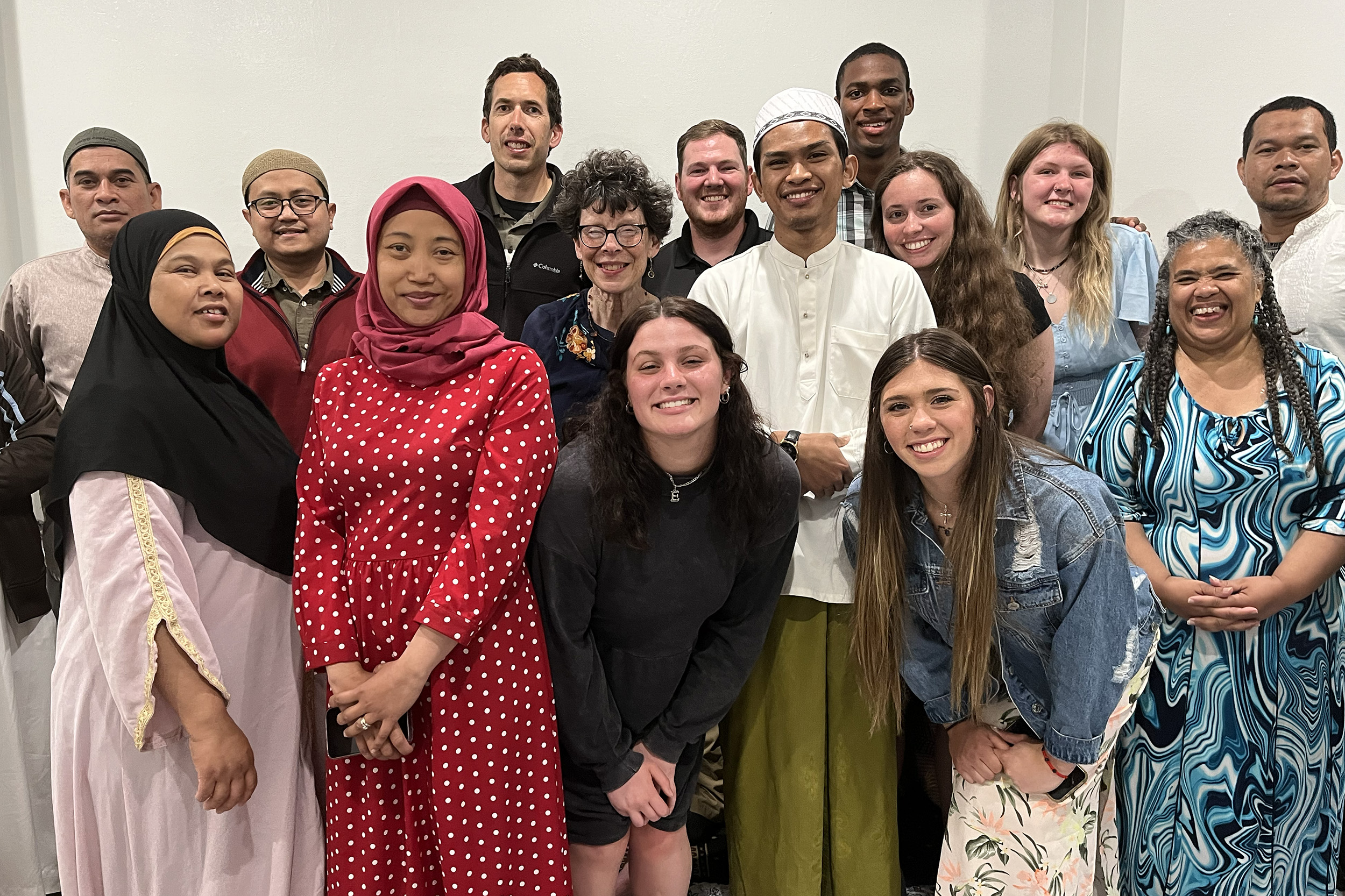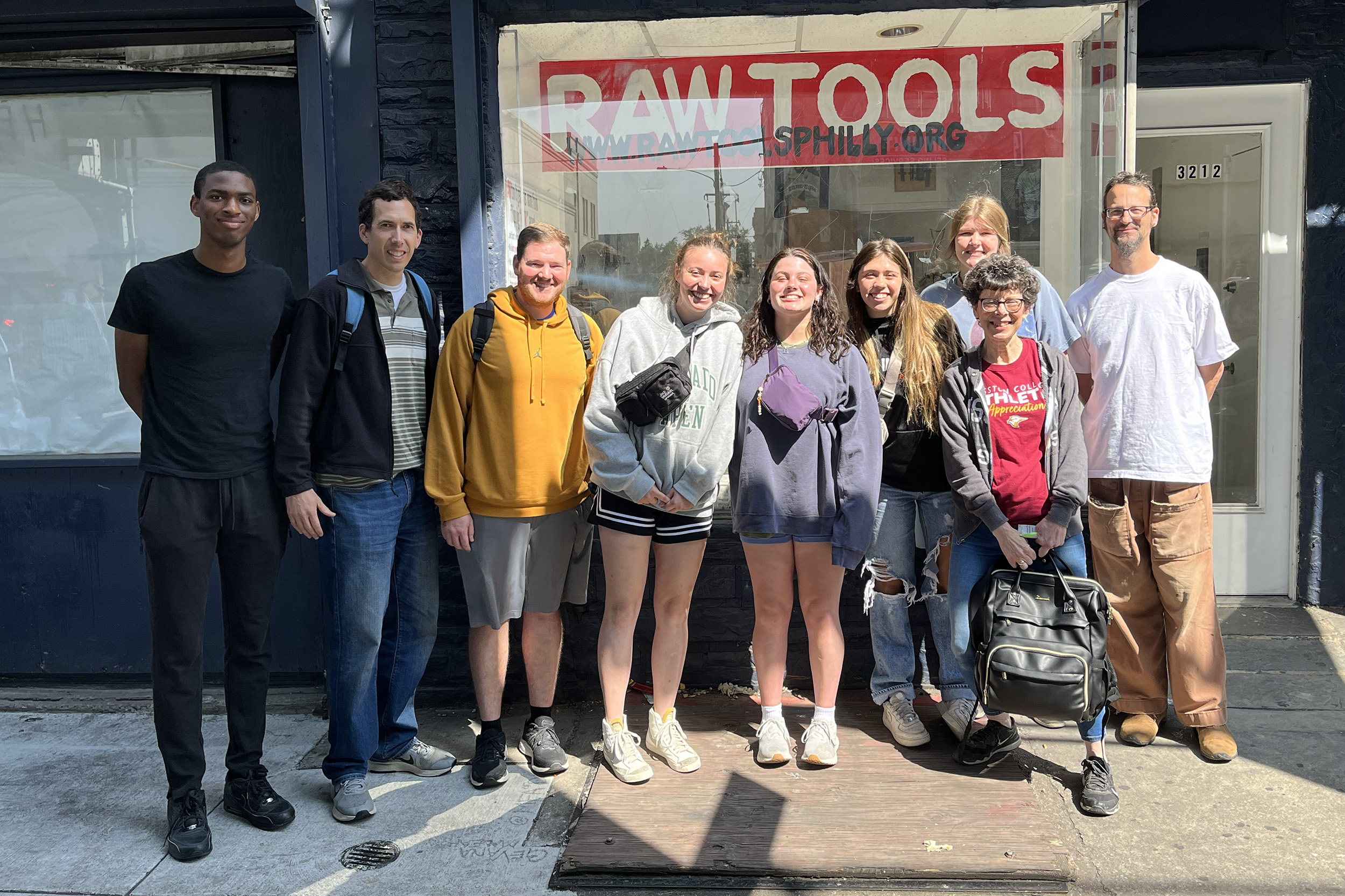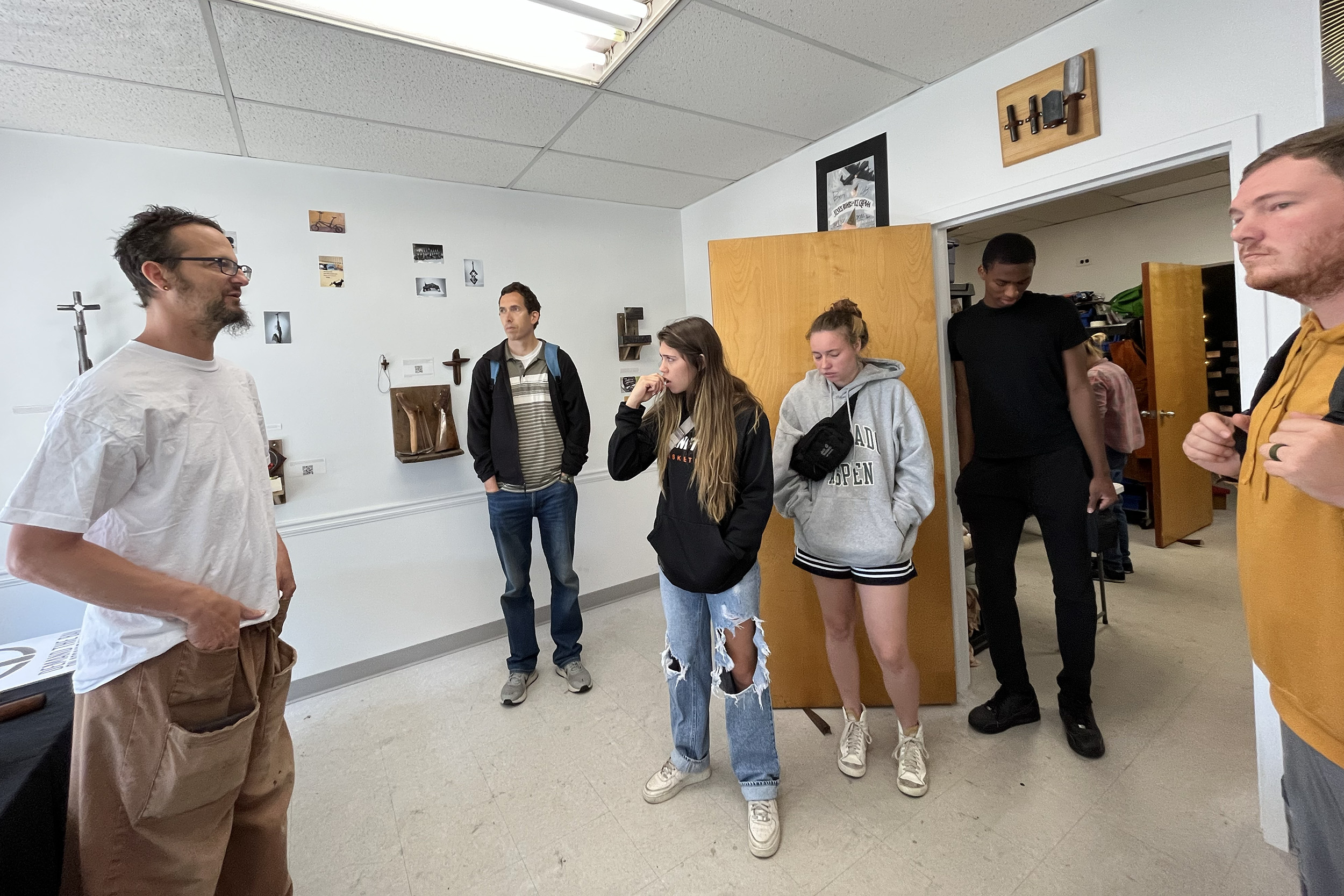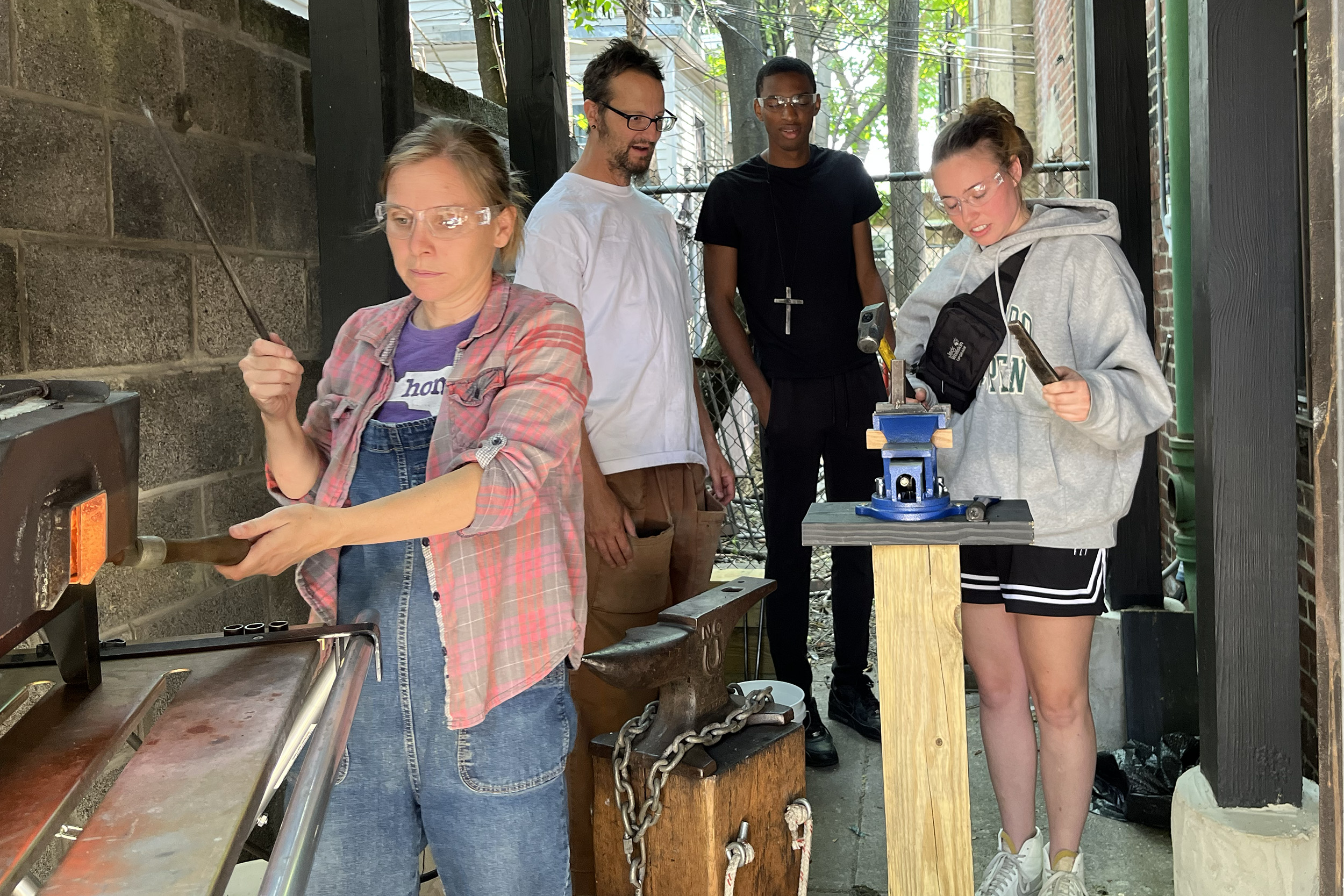Jump to date: May 16, 17, 18, 19, 20, 21, 22, 23, 24, 25, 27, 28, 29, 30, 31
May 15, 2023
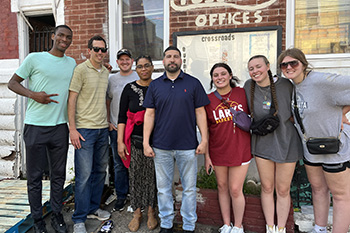
Life on Life is messy, but oh, such a gift!
Today began our first day of the Hesston College class, Urban Life and Culture, an intensive culture course on location in Philadelphia. And life it was, at the fullest. We struggled through the messiness of settling into a rowhouse apartment, the messiness of a new schedule, the messiness of new relationships. What will it mean to live together as a group for three weeks? We don’t know yet.
Most of all, we learned about the beautiful messiness of what it means to be Puerto Rican. Leader Juan Marrero explained the history that created a people with Taino, European and African blood. Who are you if you’re not Black and you’re not White? Too dark or too light to fit in with anyone?
The primary reason for this mix was brutal colonization. The Taino people were hospitable to their European guests, who took advantage of this gift and almost wiped out the entire people group. But the genocide wasn’t complete, and a beautiful, mixed Puerto Rican culture emerged. “I live with the blood of both the oppressed and the oppressor,” says Marrero. “How do you deal with the mess of that?”
“But what do you do when you find yourself with only the blood of the oppressor?” asked Keith Showalter, a Hesston College student, reflecting on his European heritage. This question launched us into a discussion of white privilege, white guilt, and the need to admit the failures of our ancestors and the equal need to stop dwelling there so much we become immobile. How do we use our privilege to change the oppressive systems now? More difficult questions, more mess. And it’s only day one.
So, we ate food together, played basketball together and walked the streets of the Fairhill hood. As one of the professors, I kept urging my students to be open-minded, to keep looking with eyes of curiosity and avoiding the eyes of confirmation, where we only look for validation of our preconceived assumptions.
And then the mess hit me. I heard some worship music downstairs, and I assumed the singer was someone besides our group, or at the very least, only one person from our group who likes singing worship songs. I tiptoed downstairs to get a look. And there were four of my students, singing away, so very different from each other and yet bonded by the music. This moment broke all my assumptions, my eyes of confirmation. I received a true gift.
Juan Marrero says that the only way to get past polarization and half-baked assumptions is do life together, life on life. To ask honest questions, to push back, to hear each other’s stories. To embrace the deep complexities of our individual lives and the complexities of many cultures living together.
To embrace the mess.
Embracing the mess is life at its fullest. May our eyes of curiosity propel us forward.
May 16 – Beauty and Pain on the Streets of Philly
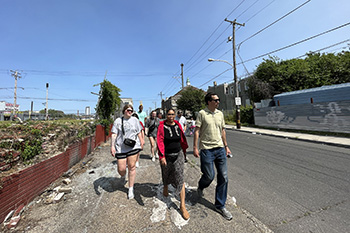
by Keith Showalter
I observed many different things in today’s walk. Some were surprisingly familiar like back home but some drastically different. I noticed many needles on the street. I am assuming heroin. Backroads at home are where we typically find these but here in Philly, they seemed more abundant. The addicts are more out in the open. I noticed multiple memorials on the streets where people have been killed. I can’t think of any back home that you can see just by walking downtown. I also noticed how much more people lived in community with one another. Neighbors know their neighbors. It appears people know people well from multiple blocks away. There was a kindness that people shared with one another that I was honestly not expecting.
I am still trying to figure out how exactly I feel. It’s a completely different way of life. I want to gain an understanding of why things are the way they are. I am not used to people being strung out at 8am walking on the street next to them, but for some unknown reason I am feeling more comfortable.
Walking past the people today openly smoking crack like it was a cigarette was bizarre to me. Why people can’t just quit? When I’ve been caught in my addictions, I quit everything cold turkey when I made a decision to change how I was living my life. I know Jesus had a big part in cleaning up my life and maybe that’s what’s missing from these people. What draws them to it in the first place? Just the high? Are they trying to numb some sort of pain or trauma in their past? Or do they get hooked just it is easily accessible?
I’m also curious about all the trash. Why don’t they care about where they live and have a desire to live in a clean place? I asked this to a wonderful man at lunch named Simear. His answer was simple. People here are just trying to survive day to day. Everything else is way down on the priority list.
Right now, the best action I can take is by continuing to listen. I don’t know everything. I don’t understand why things are the way here, but I want to be a light to this community. And I want to learn from this community. They do know each other and care for each other in ways my community doesn’t. There’s beauty and pain here, just like everywhere. And people just want to be heard and feel loved.
May 17
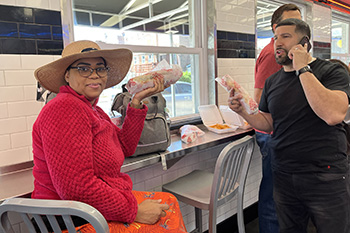
by Wideline Charles
Today we learned more about the ancestors of the Puerto Ricans, a people with a beautiful story of courage. The Taínos were great people. They had a wonderful spirit of love and cared deeply for others. One of the things Pastor Juan talked about is that they cultivated different plants like peanuts, peppers, beans, potatoes, and yuca which is something that I personally like, so maybe I have a little bit of Taínos in my blood. But learning about the battle between the Spanish conquistadors and the Tainos that took place in Hispaniola, which is the same Island where my ancestors fought their own battles, helped me understand how close we are to the race. The Tainos were very hospitable, and they welcomed Columbus to the Islands. He came and enslaved the people, stole their gold and riches, and ultimately killed them. Enrique, who witnessed how they murdered his own father, felt like enough is enough, and he fought back. But he was not the aggressor: he chose only to defend himself and his people.
Hearing this story really broke my heart because they were such good people. They knew how to live in community, and they cared for one another. These are the kind of people that today’s society would be blessed to have. I know they live on through what was left of their DNA, but it’s still heart-breaking.
If they knew Columbus was bad news, would they still have cared for them the way they did? I also wonder if they were not senselessly murdered, how much of an impact would they have on the world? Why did no one come to help them? Why they didn’t have a lot of weapons like the others had? I guess they didn’t think they needed it.
Greed, lust, war, hate, and intolerance do nothing but destroy us. I hope and pray that God opens our spiritual eyes to see these things only tear us apart and at the end of the day there is no real winner in this.
May 18 – The City is Just More
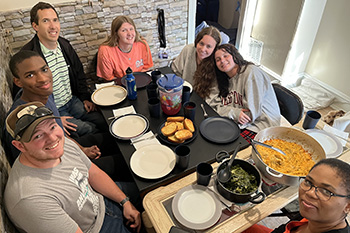
by Johann Reimer
The city is just more. It is not better, it is not worse. It is just more. We saw a lot of it on Thursday.
Our day started with some time with Pastor Juan at Crossroads Community Center. He read from Acts Chapter 17, the story about Paul preaching to Greeks in Athens where he uses their altar to an unknown god as an entry point to teach them about Jesus.
The question raised for the group after this reading was: Can you use elements of a culture to help teach people about Christ? Or, is it just too risky, as old traditions can lead to the rebirth of old habits—sin—that cause people to stumble in their Christian walk? When is “more” too much?
From a Puerto Rican context we looked at Bomba, a traditional dance on the island. This dance is undoubtedly a part of Puerto Rican culture, but for some people it is a call to the demonic spirits. So, what do we do with that? How do we take the good parts of every culture and let go of the not-so-good parts? How do we discern the good from the bad?
We closed our teaching time with this question: What color was Jesus? The consensus was that Jesus was a brown man, but what do we do with that? Why do so many images of “white Jesus” exist, and is it okay to have them as well? What about “black Jesus”? We watched a video where Israelis were asked if they were white, and it was an eye opener for our group. The responses were all over the map from “no” to “yes” to “maybe” and helped us better understand race in the context where Jesus lived.
After a quick lunch we all piled in the van to go to Wissahickon Valley Park. The group really enjoyed this time to walk for a bit and step away from the asphalt and the hustle and bustle of the city that we had been living in for almost a week. We hiked and explored and had a great time. On the hike we visited a spot on the bank of Wissahickon Creek where it is believed the first Anabaptist baptism in the U.S. took place. Did the city feel like “more” to these first Anabaptists? Did the Anabaptists take more than they should have from the Native Americans?
The next stop was Kensington, a major center for opioid addicts. We saw large numbers of people on the street shooting up. It was sobering. Each person had an individual story of sadness and loss. How did they get there? Who did they leave behind? What will happen next for them? Addiction can lead you to places you never thought you would go, and it can be a powerful force to fight against. We had to remember that just because the Kensington story of addiction is so obvious and “in your face,” that doesn’t mean it is the only story of addiction. How many people, in Philly and Hesston, are battling addictions in secret? This is not just a Philadelphia story.
The day wrapped up with all of us trying a “Water Ice” which is an iconic Philly treat. I would describe it as halfway between shaved ice and an Italian gelato. It was very good.
At moments, I thought we were taking in more than our minds could handle. More addicts than we wanted to see, more forest than we imagined in a big city. And Brown Jesus walking the streets — if only we have the eyes to see.
May 19 – Dark-Colored Band-Aids, Laundromats and Love
by Smilla Burklin
Today we talked about how Puerto Ricans vote on a regular basis if they want to stay a commonwealth or become an independent country or a state of the United States. We talked about the advantages and disadvantages of Americans moving to Puerto Rico. Puerto Rican gentrification. Yes, the Americans bring in money but they also drive people from the only homes they have. Because of the increasing numbers of Airbnbs and Americans buying real estate, rent prices are going up, and a lot of Puerto Ricans are getting kicked out of their apartments.
After this we went to get some groceries. While there, we realized that the darker-colored bandages are more expensive than the lighter ones for white people. When I realized that certain products are more expensive based on the people group they are made for, I got very angry because it seems so unfair and makes no sense to me. It creates this unbalanced power dynamic for no reason. Walking through the store I realized that there were a lot of products I have never seen before and things that I normally would expect are missing. We definitely had to adjust a little but it made me happy to see so many new products that are from different countries.
As we were in line and about to pay for our snacks, a woman in front of us asked us which pairs of pants she should buy. I was confused at first, but then it hit me. I was honored that our opinion mattered to her. I love how open and welcoming people are here because it strengthens the feeling of belonging. This was confirmed when we went to the laundromat. In one sense, it was annoying because it was more expensive than I thought and it took longer. And yet, there was a warmth there. We were doing our laundry, and we asked a man for his help. He did not hesitate to talk to us and answer our questions. This is something that I rarely experienced back home. When you ask people for help, they almost never do anything. Everyone keeps to themselves and does not really talk to anyone in the streets. This is why it is so refreshing to actually have meaningful conversations with people here.
One thing I am curious about is how many people are using the laundromat in this community. We saw quite a few people while we were here. I have never been to a laundromat before, and I do not think that those even exist in Germany. Is it cheaper to do your laundry there than buying a washer?
Lastly, I am fascinated by the sense of community, and I am wondering what makes it so strong. We can learn so much from this community. Instead of thinking what we can do to help, I recognize that we have much more to learn from this culture and how much I can gain from being here. I want to find a way to be this open and welcoming back home. Finally, I want to be more careful and understanding of how cultures like mine with more power can wreak havoc on other cultures. When have I pushed people out of their communities just to get rich quick? Maybe I haven’t ever done this, but do I turn a blind eye to it?
May 20 – Pentecost in Philly
by Michele Hershberger
Scanning a jammed packed sanctuary in an old church building, mingling with pizza and Vietnamese rice on my plate, smiling at strangers who smile right back, listening to conversations in three different languages.
Pentecost in Philadelphia.
Every year an organization called Kingdom Builders Network hosts a Saturday night Pentecost service for its affiliated congregations. And this event, at least this year, looked strikingly similar to the first Pentecost event. But instead of Parthians, Medes, Elamites, and residents of Mesopotamia, Judea and Cappadocia, like in Acts chapter 2, people heard the good news of Jesus in their own language of Spanish, Creole, Indonesian, English, Vietnamese and Chinese. There was an excitement in the air. No visible tongues of fire, but you could feel the Spirit with a fire of love for each other, even people we’ve never met before.
It might have been a bit uncomfortable, seeing all these different dialects, ways of dressing and strange food, yet something else was going on. We sang our favorite songs in our first language and tried to sing new songs in a foreign tongue with just as much enthusiasm. We knew our friends were praising Jesus not because we understood the words but by the light in their eyes. We tasted new foods, encouraged by the cooks whose loving hands made the dishes. We laughed together on the sidewalk outside Philadelphia Praise Center. Sometimes people just passing by took some food. “Help yourself,” we said. There was a lot of toe-tapping, a lot of clapping. A lot of laughing.
The bond of love transcended the language and culture differences.
Now, you might say, of course, for one night different cultures can get along. This Pentecost service, you might say, is a fine event, but day in day out, working together as the church with so many different languages and worldviews? Probably not.
But Kingdom Builders Network, day in day out, lives out the Pentecost dream. The Tower of Babel is reversed, as the variety of languages flourishes and yet, the people are one. This organization is a gathering of Anabaptist congregations who meet monthly to bring Jesus to the city. Not only are there language and cultural differences, but also theological differences. Big ones. But those differences are put aside for times of prayer, worship and planning. The main thing is Jesus and being conduits of love that Jesus can use to help Philadelphia.
It does happen every day, by the power of the Spirit. We saw it at the Pentecost service and it took our breath away. We see it at Crossroads Community Center, where Pastor Juan Marrero helps keep kids off the streets. We see it at Philadelphia Praise Center, where Pastor Aldo Siahaan and his congregation support incoming immigrants. We see it at the Everence Credit Union at Kensington, where they work to bring economic justice to the city. We see it in the local MDS unit who lets us use their van. We see it at Hesston College as it supports experiential learning like this. We see it in our row house apartment, as the ten of us learn how to live together as community.
Pentecost in Philadelphia. The Spirit is alive and well in the city!
May 21 – This Unfamiliar Thing
by Anita Castle
We were driving around the FDR park looking for the Indonesian Food Festival and the place where the gamelan concert would be held. We couldn’t find it since the park was so vast. Professor Hershberger called Pastor Aldo for more specific directions as the GPS could only give us directions to the park, not to the actual location of the Food Festival. Pastor Aldo said, ”Keep driving around. It’s big! You’ll know it when you see it!” So that’s what we did. As we continued driving, we began to see several Asian families walking in the same direction. Then we saw some Asian food trucks in a parking lot we passed. The road was filled with traffic. Everyone seemed to be trying to get to this one location in the park. Then as if rising out of nowhere, we saw the tents, stands and crowds of people. Pastor Aldo was right! This was Big with a capital B and we knew what it was as soon as we saw it!
And it looked wonderful! There was so much to see, experience and more
importantly taste! Several vendors made sugar cane juice as people waited in a long line to buy it. There were splayed-out chicken wings, sausage, shrimp and beef, each on a stick. Tables piled high with pickled mango, crickets and even frogs to eat too!
I saw so many different and new foods, but even better, I saw people of all races, nationalities and ages buying the food and enjoying it! And there was no fighting or arguing, just everyone enjoying a beautiful late spring Sunday afternoon with family and friends. It was absolutely beautiful!
I walked around with different friends enjoying the sights and sounds of people exploring different foods while admiring beautifully crafted dresses, shirts, blouses, scarves and jewelry. Since the majority of the vendors only accepted cash and my cash was limited, I found myself reluctant to part with cash for unfamiliar food. I was willing to pay cash for the fish balls, lobster balls, sausage and soft spring rolls because these were familiar foods, but when it came to the sweet banana encased in sticky rice and beans, I hesitated to spend my limited cash.
Even though I was curious, I didn’t buy it. Why didn’t I? I don’t know. However, I was blessed that my sister in Christ had already tried it and wanted me to share in the delicious experience. She bought me one. I tell you that while the other things were good, this unfamiliar thing that I was so unwilling to spend my limited cash on, was the best thing I ate the whole day! As I reflect on that, it makes me wonder if sometimes we don’t hesitate to take advantage of opportunities that God gives us to experience something wonderful because we are afraid to spend our time on that which is unfamiliar, whether that be people or new ideas. I praise God for my friend who bought that unfamiliar food for me because she didn’t want me to miss out on a great new experience!
Later, several of us ate food while sitting in the grass watching the children of all ages and nationalities run and play all around us. Their joy was infectious! The sun alternated with the clouds and the soft breeze blew. It was a beautiful day ! We shared our food discoveries and actual bites with each other. Everyone had a food story to tell about the surprising and delicious food they had tried! And I was blessed to have my own story too!
Then most of the group went to scout out a spot from which to watch the concert. I almost didn’t want to move because this spot and this day felt so perfect right where I was. Then as the people were lining up in their traditional Indonesian attire and instruments, I went to the spot our group had claimed. The musicians’ traditional attire was beautiful and even though the music was different from anything I had ever heard before, it was splendid. Then the dancers came out! Their traditional dress was even more beautiful than the musicians! The dancing was wonderful with such expressive moves that gave life to the story the narrator told us right before the dance began! I loved it, and so did the intergenerational crowd of different nationalities and races! It was a celebration of the human spirit.
I believe God looks at this cultural music and dance expression and sees great beauty. God smiles seeing families and friends of different ethnicities together in harmony.
Yes, it was a beautiful day full of delicious foods, beautiful artistry in materials, music and dance, sun and warm breezes, fellowship and celebration of Southeast Asian cultures but also a day of lessons, insight into how God wants us to live and inspiration to bring harmony, love and witness to our home communities. God is using this class to call us to try unfamiliar “bananas” and through that, be transformed!
May 22 – Serving Food in the City
by Kelbe Edwards
This is our week to learn more about Southeast Asian-Americans. After listening to Aldo Siahann, pastor of the Philadelphia Praise Center, we went to an organization called SEAMAAC or Southeast Asian Mutual Assistance Association Coalition. Our job was to help with their food pantry. There was a big line that appeared to be a block long, and there were many more throughout the day. By the time we were done, we had served over 300 people. We offered peanut butter, jelly, rice, green and kidney beans, walnuts, spaghetti, frozen chicken, chocolate chips, and gum.
I noticed how courteous the people were, even though the majority of them didn’t speak English. It felt good collecting the products and presenting them to the people, and even though we couldn’t fully understand each other, it was still rewarding. It humbles me to witness their persistence and bravery in the face of adversity. Each interaction makes me think. What are their lives like? What brought them to Philly? Why do they stand in long lines for this food?
I’m curious about how frequently individuals may come and get this free food. Can they come every day or only once a week? How many individuals does SEAMAAC see every week, and do they know the majority of their clients by name or even on a personal level? When I return home, I want to locate a center like SEAMAAC and continue to aid others.
May 23 – We are all Equally Human
by Emily Miller
The food pantry line was the longest line I have ever seen for something. People were standing in line for what felt like hours. I saw some different ethnicities in the line, even though it was a Southeast Asian food pantry, or that’s what it seemed like from what we were told.
I also saw so many people who loved doing what they were doing for people in need. And the workers at SEAMAAC didn’t just want to help. They wanted to preserve the dignity of the people waiting in line. So, people got to choose what they wanted. They weren’t just handed a bag of food, food they maybe didn’t want or could use. They made choices. And then we filled their orders. People were so grateful for what they were getting.
When I was working on preparing the orders, I felt this overwhelming feeling of guilt. I felt guilty because I knew that wherever I am, I will have the opportunity to buy food and the things I want. But these people don’t have that opportunity, and it made me feel so bad about everything that I have. I know people in this world are hungry and desire more things than they have, and I have never really thought about that deeper than simply the understanding that there are people who struggle on a daily basis. I now realize that there are real people, human beings, who don’t have the same things that I have, but that doesn’t make them any less human than I am.
I don’t understand why some people look down on people who need food. Why are human beings judged on the fact that they have less than other people do? It makes me wonder how this world is going to survive if people are judged based on their ranks in society, or on what they don’t have. I want to take what I learned and make it useful in my town. I want to let people know that we are all equally human and loved, no matter how much they have. I want
them to know this even if they don’t see it or feel it. I want every human being to know their worth, no matter what their lifestyle may be.
May 24 – Immigration
by Emily Miller
There are so many people who want a chance at a good life, and there are so many innocent people who get hate for wanting a good life. People are trying to come across the border with their kids and they aren’t let through. Families are separated. Kids grow up without parents, and parents have to suffer that their kids grow up without them. Siblings grow up without each other and don’t have attachments to each other, and it makes families drift apart. Kids become orphans because their parents couldn’t pass up the chance at a better life.
When Pastor Aldo was talking about immigration, I felt a knot in my stomach because I have grown up around people who look down on people who want to come to the United States. I have listened to my grandma talk about how these “aliens” are coming into our country and taking our jobs and making America a terrible place. I have never agreed with her on that matter because I know people come here to get a better life for themselves and their families. When Pastor Aldo was talking about it, it made me even more grounded on the fact that we need to support these immigrants. I truly believe that people should be able to come to the United States to get a better life, and I firmly believe that it should be okay to shelter these people until they get on their feet. You know, most of our ancestors were immigrants too.
May 25 – Kale Soup
by Keith Showalter and Michele Hershberger
Today we interacted with an urban farmer, Pak Tani, which means Mr. Farmer. It’s a term of respect. He’s also Muslim. We got to visit with him because of Pastor Aldo Siahaan. We observed the connections Pastor Aldo had with the non-Christian community, especially the Indonesian Muslim community. Good inter-faith relationships are already incredible in this day and age, but if you understand the context for Christian-Muslim relationships in Indonesia, this relationship is extra special. The Indonesian Christians who immigrated here did so because the Indonesian Muslims persecuted them. In Indonesia, the Christians were a small minority. Here they are the majority.
Several years ago, the Indonesian Muslim mosque here in Philly burned down, right before Ramadan. Pastor Aldo offered his Mennonite church to them to use for their special celebrations. Even though he was criticized by many for doing this, I think he did the right thing. He showed love to people who represented his enemy.
And now Pak Tani, the Muslim urban farmer, was able to show hospitality to us. And it was incredible. He taught us about composting, the importance of earthworms and how to get a banana tree to grow in Philly. He fed us plantain chips, fruit, coconut water, dates and special cookies. He gave us a children’s book on farming, written in both English and Indonesian. Best of all, he gave us a big bunch of kale.
Reflecting on all this, I saw how politics can drive persecution on people. Pak Tani treated us as friends, and this is not what we’ve been taught to think about Muslims.
I stopped looking at news and deleted my social media over a year ago. This has been a positive experience in my personal life, but I have found that it has been hindering my ability to be aware of everything happening in the US and the greater world. Is it better to not read or listen to any news, or to research more deeply to get to the truth? I reflected on my own hospitality and how I treat others, especially those who are not of the Christian faith. I can only speak for Christians in my area, but why do we not show the same hospitality as other religions?
The next day, we made kale soup. The day before had been a tough day food-wise, and leftovers was all we got for lunch. We could have done leftovers again for supper, but instead we took the kale and whatever ingredients we already had and made a delicious soup. The taste was unexpected, the color a bit unique, but everyone liked it. We tried something new.
Perhaps in his own way, Pak Tani is like our kale soup. His hospitality and friendship were unexpected. He uses what he has to build bridges between people. And like that kale soup, the experience was very, very good.
May 27 – Ordination and Open-Mindedness
by Trinity Ramirez
Today was a very good day. I hadn’t been to church in a while, and I was excited to be at a service, but I was also nervous that I wouldn’t connect very well at this church.
But I was surprised — in a good way!
During the service, each person who spoke said a lot of things that resonated with me. Even though this was a service ordaining Pastor Juan as a bishop, God had a message for each person there. Good leaders truly love all people. Good leaders take risks. Good leaders rely fully on God and not themselves. It’s an impossible task, but with God all things are possible.
I loved the worship. A gospel choir sang, starting slow and then building up to a crescendo of emotion, praising God because we are protected in all ways. And not only was the worship and preaching impactful, but the diversity of people touched my heart as well. The sanctuary was packed with 50% African-Americans and 50% European-Americans, and we were all worshipping together. We were shouting, clapping, singing to God and celebrating the ministry of Pastor — now Bishop — Juan Marrero.
So why did I hesitate at first? Why was I nervous that I wouldn’t connect? I wonder what it is about human nature that causes us to have a certain way of thinking and believing and in turn not wanting to experience different things from what we usually do. I wonder why I tend to be one who’s stuck in my ways and unwilling to experience new things. I pray that God would help change this about me so that I am more willing to understand others and the way they think.
May 28 – Seeing God Everywhere
by Michele Hershberger
A Black gospel-style ordination, an evening mosque service and an energetic hour of praise in Spanish. It was truly a weekend! In some ways, the three worship services were very different, yet the similarities were striking!
On Saturday afternoon we drove an hour to Lower Skippack Mennonite Church to witness the ordination of Juan Marrero as Bishop. We celebrated Juan in a worshipful mix of Puerto Rican and Black cultures. Hands raised, we shouted, “Hallelujah!” We “kept on walking,” “kept on praying,” and “kept on shouting,” as the gospel choir swayed and urged us to trust God for everything. Dr. Rev. Couch started his sermon out slowly, but as the Spirit moved, he began to shout and jump! “Don’t let pride sneak in” he admonished the new bishops, “And remember, God chose you for this mission. Have a magnet in your heart and a compass in your head.” The service continued for almost three hours, with testimonies, blessings, and a laying on of hands. Then as one diverse but united body, we broke bread together with a meal.
From there, we drove straight to a rowhouse mosque in South Philly. We took off our shoes and silently listened to the men chanting prayers. We had taken up the space reserved for the women, but they assured us they didn’t mind meeting elsewhere. This service was more subdued. We didn’t understand the words, but we felt their reverence. Later, the Imam gave a homily in English, encouraging all of us to be humble. When they opened the floor for our questions, I was nervous about what would happen, but it was a respectful interchange. And then we ate! Our Muslim friends insisted we go first, and the feast was incredible! Indonesian chicken and rice, spicy side dishes, fried tofu, sweet sticky rice in a variety of colors and so much more. We sat on the floor and talked to our newfound friends until 10:30 in the evening. We left as they took up prayers again.
Sunday morning found us at a Mennonite church called Centro de Alabanza, the Center of Praise, and this congregation lived up to its name. We sang with full voice for an hour, all in Spanish. Several of us knew some Spanish, but even those who didn’t know a word knew this group was full of passion for Jesus. Pastor Fernando Castro shed tears as he sang. We lifted our hands in the air, our hearts pounding. The sermon addressed the problem of domestic violence. Here we witnessed an intentional focus on both our relationship with God and others. The same ones who sing praises to Jesus can’t also be hurting the ones they love.
Two services were Christian, the other Muslim. One was held in an historical Mennonite church north of Philadelphia, surrounded by an ancient cemetery, another in a rowhouse and the third in a restored church building in the middle of the city. The music, the clothing—even the languages were different. But in all three services, I felt love. Our hosts welcomed us, fed us, admonished us—loved us. And where there is this kind of love, God is honored. God is there.
May 29 – Sundown Towns
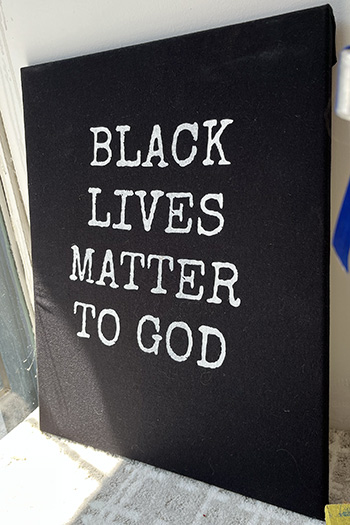
Today we learned about the economics of race, including the reality of sundown towns. During Jim Crow days, African-Americans couldn’t be in certain towns after sundown or they would be killed. This made it difficult for African-Americans to travel north to find better jobs and communities to live in.
Personally, I have seen signs for sundown towns. There is a small town in Oklahoma called Ada, and they still have a sign up that says that they were once a sundown town. I never realized that a town would take pride in that and that after all these years would still have a sign that says they were once a sundown town because that is disgusting to even recognize that something so cruel was once there. I first saw the sign when my team and I were on the way to a basketball game. I was sitting next to my friend who was African- American. I noticed that when she saw that sign, her entire mood changed and she stopped talking instantly. That is when I first learned about sundown towns.
When our class discussed sundown towns, I instantly felt rage and guilt come over me, even though I wasn’t even alive when those were still around. To imagine that some human beings were once told that if someone sees you in this town after dark you will most likely be killed is something that people can’t just forget about. I felt guilty because I am white, and I know that if I was alive when that was going on, then nothing would have happened to me and that just makes me sick to my stomach that it ever happened to anyone.
Why were sundown towns even a thing? No matter what the color of your skin is, you are still human beings inside and out. I can never fathom why someone would just kill someone else because of the color of their skin. And it makes me even more angry that it is still going on today. I don’t understand why a town would purposely keep people out of it just because of their race. If I’m being completely honest, I don’t understand why racism was ever a thing and the fact that people just choose to ignore that it ever existed is something that I will never understand.
The sign in Ada, Oklahoma, is no longer up because of my basketball team. One of the girls on my team was originally from Ada, and she personally knew the mayor and she got us an invitation to talk to him about the issue. Then, six months later the sign was taken down and a memorial for the people of color who were lost during those years was put up. I want that for every town that was once a sundown town, and I believe that if I helped one town realize that it wasn’t okay for having a sign like that up, then I can help other towns too. I want to do what I can to work against racism.
May 30 – I Want Everyone to Win
by Keith Showalter
Leonard Dow opened my eyes to something called the zero sum game. This is the name for the belief that in order for one group to win, the other group has to lose. Both groups can’t win; it’s either one group of people who wins or nobody wins. And that one group of people is the white group.
I am frustrated with my white brothers and sisters. I am frustrated with myself. I am frustrated with the school systems where I am from. We are all guilty of at least having some knowledge about the injustice going on and are not doing a DAMN thing about it because it does not affect us.
I am frustrated now for a different reason. I have been wanting to do something about it but just don’t know how. I have started building more relationships with people who don’t look like me, and I guess that is where it starts. And in my frustration, I also need to love the ones I’m frustrated with. If I want them to be more open-minded to people who look different then they do, then I too need to be open-minded to them. What is it that makes them—and all of us—prone to shut our eyes to the oppression of others?
This experience as a whole has been making me reflect on my own town in regards to how we are helping and receiving from underserved communities. How have I been impacting the community I live in a positive way? My mind continues to be opened to the greater world I live in and what people have gone through and how that is still affecting them to this day. My problem is that I want to do it all. I want to help everyone and I know I can’t. As we are ending on our time here in Philly, I’m reflecting on everything we’ve been learning, listening to the Spirit as to how God can use me back home with my experiences here. I’ve got to keep listening, keep my heart open and allow my soul to heal from what I have experienced here.
May 31 – Guns into Hearts
by Smilla Burklin
Today we went to the Everence office in Kensington. We talked to Kevin who explained how the Everence bankers were teaching financial literacy to their customers. He told us how Everence is allowing people to get checking accounts or loans that no other bank would give them due to their background or circumstances. He also explained how a lot of people in Kensington cash their checks at a Quick Pay business rather than using a bank, and how this is a disadvantage because of the high interest rates from check cashing places.
After this we went to RawTools, a shop where guns are turned into garden tools and jewelry. Shane Claiborne told us about the gun violence and drug epidemic in Kensington and how this shaped the neighborhood over the last two decades. Our conversation with Shane frustrated me. As an international student I do not fully understand why Americans are so attached to their guns. No one else seemed intimidated by all the different guns in there, but I was scared the whole time. I never held a gun before, and it just makes me very uncomfortable. Destroying the guns and turning them into different tools, however, had a very therapeutic effect on me. I pounded a red-hot gun barrel until it was smooth. Eventually it will be shaped into a garden tool.
Talking about gun violence triggered me because about a year ago someone shot a student at my former university in Germany which had a big impact on me and my friend group. It was hard to pay attention, and I could feel how everyone was tense and anxious. Almost everyone in our group has lost someone to gun violence. And yet Shane Claiborne and others are trying to raise awareness and change laws so that it’s harder for some people to get AK-47s and other guns designed to kill people in a short amount of time. The last thing we did with Shane and his wife Katie was to make little metal hearts from a gun barrel. Perhaps this is a tiny sign that love can triumph over hate.
After our talk, we took a walk around the block and he told us about The Simple Way. The Simple Way is a group of Christians dedicated to living simply and working for justice in this neighborhood. While walking around, I noticed the smell. Almost everywhere the scent of pee was overwhelming. I was scared and intimidated, and I caught myself avoiding eye contact.
All in one place and all in one day, we talked about gun violence and pounded gun parts into tools. We saw trash in the streets and flowers in a community garden. We witnessed people shooting up and took photos of murals that spoke of hope. We talked to bankers from Everence and The Simple Way people, both groups doing very different things for the same reason—they want justice for this neighborhood. We will be here for just one day, but they are here day in and day out, pounding out metaphorical gun barrels into tiny hearts.


